
Tributes
beloved Ann Refugee dies at age of 96 p12




Tributes
beloved Ann Refugee dies at age of 96 p12


by Richard Ferrer richard@jewishnews.co.uk
@richferrer
The mother of Yoni Jesner, the Scottish teenager killed in a 2002 suicide bombing in Tel Aviv, says she feels a “surreal sense of disbelief” at the release of the terrorist who masterminded the attack.
Ashraf Zughayer, who arranged the bombing that killed six people, including 19-year-old Jesner, was released from prison on 25 January after serving just 22 years of six life sentences.
Zughayer drove suicide bomber Muhammad al-Ghoul from East Jerusalem to Tel Aviv, dropping him at the Allenby Street bus stop moments before the attack that killed Jesner.
His release came as part of the Israel-Hamas ceasefire deal. He was given a hero’s welcome in East Jerusalem, paraded through the streets on the back of a car
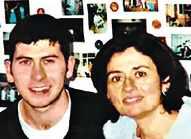
and draped in Hamas flags as crowds cheered.
Yoni’s mother, Marsha Gladstone, has shared her family’s anguish about the decision, telling Jewish News: “We feel a surreal sense of disbelief that this is even possible, that this person can be out and about, enjoying the freedom he stole from our beloved son. That 22 years later he is a free man. It’s shocking and sickening.”
But reflecting on the broader implications of the hostageprisoner exchange, Gladstone, who was not notified by the Israeli government about Zughayer’s release, added: “I understand there is a greater duty at play here. That we need the hostages home and the price to pay is an awful one.
“If the loss of Yoni can somehow contribute to something good, even all these years later, to bringing home the hostages to their families, then that is at least a small comfort to me in this crazy world.”
In a moving column for The Free Press, headlined ‘The Terrorist who murdered my cousin now walks free’, Yoni’s cousin, Rabbi Gideon Black, who narrowly survived the bus bombing, expressed his anguish at seeing Zughayer walk free. Black wrote: Continued on page 2

Donald Trump shocked the Middle East on Tuesday by declaring that the United States would take control of the Gaza Strip after the war there ends. He made the pledge alongside Benjamin Netanyahu at the White House. Full story, page 2
President Donald Trump has said he wants the US to “take over” the Gaza Strip and create the “Riviera of the Middle East”, writes Lee Harpin.
At a White House press conference alongside the Israeli prime minister, Trump said: “The US will take over the Gaza Strip, and we will do a job with it too.
“We’ll love it and be responsible for dismantling all of the dangerous bombs and other weapons on the site… and get rid of the destroyed buildings [and] create an economic development that will supply unlimited numbers of jobs and housing.”
At one point in the meeting that shocked those watching it, Trump claimed “everybody” he had discussed his Gaza plan with “loves it”.
The president claimed that he had spoken to the leaders of other Middle Eastern nations. “They really love the idea,” he said. “I do see a long-term ownership position.”
“And I see it bringing that stability to that part of the Middle East and every part of the Middle East… Everybody loves the idea of the US owning that piece of land, creating thousands of jobs.”
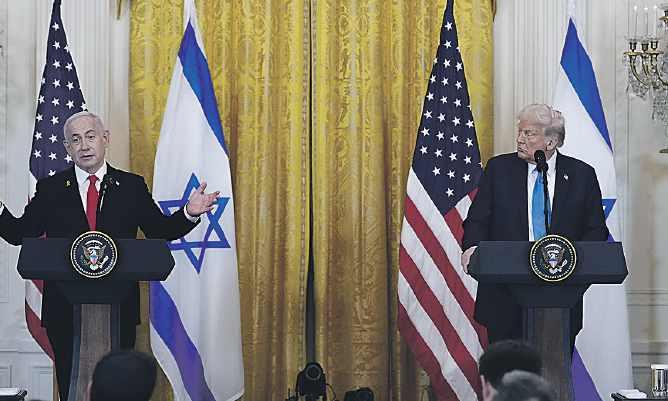
He later claimed the move would make Gaza the “riviera of the Middle East” for the“world’s people” including Palestinians. But earlier in the press conference the US president spoke of the resettlement of Palestinians from the “hell hole” of Gaza in countries elsewhere. Trump said the US would level destroyed buildings in Gaza and “create an economic development that will supply unlimited numbers of jobs and housing ”. He added that Gaza’s population of about 1.8 million should be transferred to countries “of interest with humanitarian hearts”.

Caption to go here
He said on Tuesday that Gaza should not “go
through a process of rebuilding and occupation by the same people that … lived a miserable existence there”. Instead, Palestinians should go to other countries, without naming them. “It could be sites or it could be one large site” where people would live “in comfort and peace. They’re not going to be shot at and killed.”
Trump claimed the “only reason the Palestinians want to go back to Gaza is that they have no alternative”.
Trump added that the rebuilding of Gaza could be “paid for by neighbouring countries”. Asked whether he would back Israel annexing the West Bank, Trump said he would be “making an announcement” on the matter in the coming weeks.
Netanyahu described Trump
Continued from page 1
“More than two than two decades later, emotional scarring from that bombing – which I survived by the slightest margin – is still etched into my soul. The moments after the explosion are still vivid in my mind –the shattered glass, the heap of skinless bodies at the front of the bus, the few silent seconds as an aura of death hung in the air before it gave way to piercing sirens and screams. Most of all I remember Yoni, in life so strong and brave, on the floor next to me with a mortal head wound. The first paramedic to treat us on the sidewalk cried
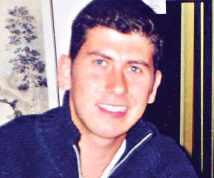
out to Yoni, “Al tamut, al tamut!”
(‘Don’t die, don’t die!’)”
The Israeli hostage/Hamas prisoner swap has reignited fierce debate in Israel over the risks of
releasing convicted terrorists. Rabbi Black acknowledged this dilemma, stating: “We must move mountains to bring them home, even as we fear that those very mountains may bury our loved ones in the future.” We dare not leave the hostages in Gaza,” Black warned. “We dare not free the terrorists and endanger our people for years to come. Truly, a deal with the devil.”
Yoni and his family saved the lives of four people by donating his organs following his death, including a Palestinian girl who received Yoni’s kidney.
Editorial comment, page 18

BY RICHARD PATER
Despite the meeting taking place after midnight Israel time, all eyes were on the White House as President Trump appeared to renew his bromance with Israel’s Prime Minister Netanyahu. Netanyahu’s visit to DC marked the 14th time he has enjoyed the hospitality at Blair House (the traditional base for visiting VIPs), a record for any foreign leader. At their meeting in the Oval O ce one had the impression it was back to business for the pair, who fell out when Netanyahu congratulated Joe Biden on his 2019 victory.
“the greatest friend Israel has ever had in the White House”.
He said: “Your leadership has brought hostages home,” adding that he had “confronted antisemitism, stopped funding UNRWA, and renewed maximum pressure against Iran”. He praised Trump for moving the US embassy to Jerusalem, and said the president himself had brokered the Abraham Accords.
“You picked up right where you left o ,” he said. “You freed up munitions that had been withheld from Israel in the midst of a seven-front war for our existence.”
Israel’s PM added: “Ladies and gentlemen, all this in just two weeks. Can you imagine where we will be in four years?”
Donald Trump managed a rare feat on Tuesday night: uniting the world in opposition. Whether in Keir Starmer’s measured tone or Saudi Arabia’s blunt condemnation, his plan to forcibly relocate Gaza’s population was met with near-universal outrage. Yes, many – including in our own community – recognise the need for fresh thinking to avoid painful past failures and com-
The most remarkable aspect of their latest encounter was Trump’s assertion that the US would take over the Gaza Strip and redevelop it, “as a kind of riviera of the Middle East”. He also doubled down on his idea of relocating 1.8 million Gazans, seemingly oblivious to historic Palestinian trauma associated with relocation. Further, he caused anxiety among two of Israel’s neighbours and allies, Egypt and Jordan, suggesting that they would provide a home for the Gazan refugees.
In a third act to agitate the Arab world, Trump suggested that Saudi Arabia was not demanding a Palestinian state in return for normalisation with Israel. This triggered the Saudi Foreign Ministry to issue a denial at 4am local time.
While this is a US plan, it is convenient for Netanyahu in his e orts to keep his coalition intact. However, for many Israelis the key priority is to see the hostage deal extended beyond the first phase, and to see all the hostages return home.

pletely remove Hamas from the equation. With a two-state solution looking increasingly unfeasible, new ideas are inevitable. But swapping that goal for something straight out of an Itamar Ben-Gvir manifesto has set alarm bells ringing. Was this just another fanciful ploy from a transactional, unconventional president? Perhaps. But only those in Trump’s inner circle truly know.
by Lee Harpin lee@jewishnews.co.uk
Strictly-Orthodox Jewish community representatives are facing claims they “refuse to engage” with local authorities in Hackney over growing concerns about safeguarding issues at yeshivas in the London borough.
Leaders of Hackney’s Children and Young People’s Scrutiny Commission (CYPSC) have written to education secretary Bridget Phillipson to say there is a “real and significant risk” for a rising number of boys from Charedi families.
They warn the children are being withdrawn from independent schools and placed in yeshivas from the age of 12 “where they receive only religious instruction”.
Despite having tried to meet with those running the yeshivas and with leaders of the Union of Orthodox Hebrew Congregations (UOHC) with a “safeguarding support offer”, the commission has been snubbed.
Writing to Phillipson after its most recent review in December, CYPSC co-chairs Sophie Conway and Margaret Gordon concluded that “even with a clear strategy, sound intelligence and strong inter-agency collaboration, local efforts to address the safeguarding risks within unregistered education settings (UES) are limited, particu-
larly when the operators of such establishments refuse to engage”.
A further report delivered by the commission to Hackney Council at the end of last year noted: “Efforts have been ongoing to engage with Orthodox Jewish representative bodies regarding safeguarding practice in UES and ensure we have assurance as to those arrangements. However, these have not been successful at bringing about satisfactory engagement with themselves to provide the necessary assurance we seek.”
The report said that as a result of inadequate legislative provisions, oversight and enforcement, more than 1,500 children aged 12 and over were “at risk” as the settings in which they were taught were out of “line of sight” of safeguarding, both in terms of the narrow curriculum they offered, and in terms of health and safety as a result of poor conditions.
Ofsted officials, along with those from the police and fire brigade, had been involved in investigations into the unregistered settings, with at least two new yeshivas emerging in the borough during the year 2023-24.
The commission confirmed that in December, 1,586 children and young people, predominantly from the strictly-Orthodox community, were known to be at unregistered settings in the borough. This compares with 1,456 recorded for last April.
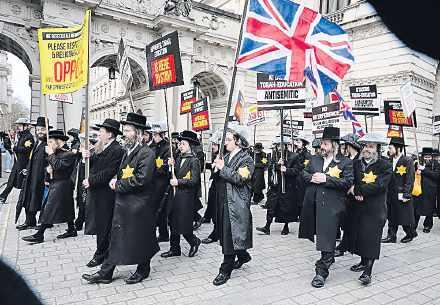
The commission added: “In Hackney, the vast majority of children we believe to attend UES are teenage boys within the Orthodox Jewish community, who are withdrawn from a school where they receive a wider curriculum at aged 12 and placed in a yeshiva where they receive only religious instruction.”
They have also confirmed that those running unregistered yeshivas have in the past tried to evade detection by moving the UES somewhere else after being identified.
The report also noted that community-specific sessions set up to
deliver safeguarding training for yeshivas and Orthodox Jewish settings “were not attended”.
This contrasted with sessions set up “to deliver attendance training for our Charedi independent schools, which were very well attended”.
Confirming there was evidence of children vanishing from the schools register, the commission wrote: “The typical pattern in the number of children believed to be attending UESs in Hackney, the number increases in the autumn term when independent schools report large numbers of children electively home educating,
Thousands of Charedi men and boys have taken part in a public display of prayer and fasting in Stamford Hill in protest against aspects of the Children’s Wellbeing and Schools Bill, which is in committee stage in the House of Commons.
The protests took place in three locations – Yesodey HaTorah School, Bobov and Vizhnitz synagogues – and were organised by the Union of Orthodox Hebrew Congregations (UOHC), which says the bill “poses an unprecedented threat to the autonomy of yeshivas and the Torah upbringing of Jewish children”.
Participants recited the Book of Psalms followed by afternoon prayers. A similar prayer day will be held next week in Manchester, though without fasting.
The Yeshiva Liaison Committee (YLC), operating under the UOHC, has been at the forefront of opposing the bill, which, in one section, seeks to redefine yeshivas as schools, thereby subjecting them to Ofsted inspections and government oversight that would dismantle them.
Rabbi Yitzchok Moshe Kornbluh, director of the Yeshiva Liaison Committee (YLC), said: “Yeshivas are not schools in
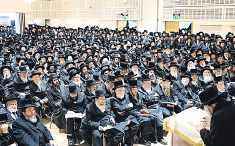
the conventional sense; they are spaces dedicated to the spiritual and intellectual development of Jewish youth and operate alongside home schooling. The government’s proposed legislation threatens to dismantle this centuries-old tradition... replacing parental and religious rights with secular state-imposed uniformity.”
Shimon Cohen, of Roath PR, is supporting the protesters. He said: “It is extremely important to fight this, battling the huge amount of misinformation being spread about the Charedi community. Sadly, yeshivas are being unfairly targeted based on narratives that do not reflect their reality or the families they serve.
“The message to parliament is a clear
one: faith communities must not be unfairly singled out, and Jewish parents must retain the right to bring up their children in accordance with Torah values.”
Rabbi Benjamin Stern of the UOHC expressed his gratitude for the support at the event. “The turnout was a resounding declaration of our community’s commitment to Torah chinuch. (education),” he said. “We will not stand idly by while our way of life is threatened. Our unity in tefillah (prayer) and fasting reflects our deep resolve to protect our sacred heritage for generations to come.”
Yehudis Fletcher, co-founder of Nahamu, which counters extremism in the Jewish community, told Jewish News: “The UOHC’s Yeshiva Liaison Committee is spreading panic and disinformation. Yeshivahs, if registered, would be required to follow the independent school standards, which require basic secular education. The assertion that all boys should receive an exclusively yeshivah-based education is at best a postHolocaust innovation. It is ahistorical to characterise this system of recent vintage as a ‘centuries-old tradition”.
and then decreases at the end of the summer term when the Y11 cohort are removed from the register.”
It also said known families of those at unregistered settings “receive a wellbeing visit, an offer of support to ensure they are providing a suitable, efficient and full-time education for their child (which is typically refused) and an annual safeguarding home visit, with follow-up written contact to those families officers are unable to see or meet with”.
The report said it was “important” to distinguish between UES and illegal/unregistered schools. The latter deliver a full-time education and a curriculum that is broad enough for the setting to constitute a school. As such, these fall within the regulatory powers of Ofsted and so there is a statutory response available to councils on identifying them.
While UES provide an education to children of compulsory school age, they “teach a curriculum that is too narrow for the setting to constitute a ‘school’”. The consequence is they cannot be registered in the same way schools are. “This was and remains a significant issue of concern for the safeguarding partners of the CHSCP,” added the report.
Jewish News has contacted a spokesperson for the yeshivas, the UOHC and the Department for Education for comment.
Two north London charities have become the focus of inquiries by the Charity Commission, which says there are “regulatory concerns” about their trustees’ management and administration,
The two bodies are Solev Co and Hatzlocho. According to a statement on the commission’s website, Solev, which was set up in 1967, has raised questions about conflicts of interest “given that the trustees were, until recently, all part of the same family. The previous trustees were all closely related.”
The Charity Commission says that “trustees are expected to act in the best interests of the charity and properly manage any conflicts of interest. The inquiry will also investigate why the charity has not submitted accounts and annual returns within the statutory time-
frame for the past five years and is currently in default with their 2023 and 2024 accounts, which is a legal obligation for trustees.”
Hatzlocho says its purposes are to “advance the Orthodox Jewish faith and relieve poverty”. The commission says it is investigating “similar concerns” relating to possible conflicts of interest among the trustees.
Companies House shows close relations between the two charities. According to its website, Joseph Tager and Simon Tager resigned as directors of Solev Co last month. Helen Tager Flusberg, Suzanne Tager and Nicola Tager all recently resigned as directors of Hazlocho.
All three current trustees recently registered with Solev Co on the commission’s website are also registered as trustees with Hatzlocho.
The British-Israeli hostage Emily Damari, together with her mother Mandy, personally thanked Keir Starmer for campaigning to bring her home during an emotional phone call, writes Lee Harpin.
The prime minister said he was overjoyed by the “heartwarming” images of Emily being reunited with Mandy, who campaigned tirelessly for her release.
Starmer invited Emily to visit 10 Downing Street after she recovers from her 15-month ordeal in Gaza.
Emily, 28, was kidnapped from her home on 7 October 2023 by Hamas gunmen, who shot her in the hand and leg, as well as killing her pet dog.
On the phone call, Emily and Mandy revealed that she had been held for some time in United Nations facilities belonging to the United Nations Relief and Works Agency (UNRWA) and was denied access to medical treatment.
An out-of-date bottle of iodine was the only medication that was provided to her during the course of more than a year of captivity, despite having lost two fingers from her left hand on 7 October, and with an unhealed gunshot wound in her leg.
The mother and daughter asked the prime minister to put
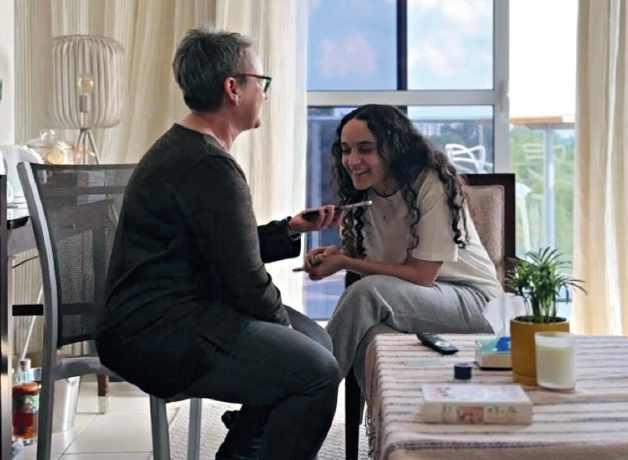
maximum pressure on Hamas and UNRWA to allow the International Committee of the Red Cross to finally have access to the 82 remaining hostages still being held in the territory.
The structure of the deal
The BBC has apologised after one of its televisioin news presenters described Israeli hostages held by Hamas as “prisoners”, writes Lee Harpin.

Nicky Schiller, a presenter on the BBC News channel, told viewers that three “Israeli prisoners” were due to be released by the terror group on Saturday.
The three men – Yarden Bibas, 35, Ofer Kalderon, 54, and Keith Siegel, 65 – had all been taken hostage by Hamas during the terrorist attacks on 7 October 2023.
Schiller told viewers last Friday: “Confirmation in the last couple of hours, first from Hamas, that three Israeli prisoners, all men this time,
will be released tomorrow and then we will see 90 Palestinian prisoners freed from Israeli jails.”
The BBC issued an apology, saying: “Earlier today on BBC News we reported on the names of those three Israeli hostages who are due to be freed tomorrow.
“At one point during the coverage we mistakenly called the hostages ‘prisoners’ and we would like to apologise.”
agreed by Israel and Hamas allows for a gradual release of hostages over several months. Some hostages are elderly or have serious injuries, and may require urgent treatment that has been withheld.
On the call, the prime minister
enquired about Emily’s condition after her return, to which Mandy replied that she “seems to be doing pretty well psychologically” although she has a long road ahead.
‘I treasure message from Emily’: pages 14 and 15
A 29-year-old man has admitted a series of antisemitic posts andexpressions of support for Hamas.
Zakir Hussain had denied wrongdoing but changed his plea to guilty of the 11 charges against him on the first day of his trial at the Old Bailey trial.
The defendant, of no fixed address, pleaded guilty on Monday to four charges of expressing support for proscribed organisations Hamas and Hezbollah.
The o ences related to posts on X, formerly Twitter, on dates between November 2023 and January 2024. He admitted a further seven charges of stirring up racial hatred in comments about Jews on the same website.
In his posts Hussain hailed the attacks of 7 October 2023, when about 1,200 people were

killed in a Hamas-led attack on Israel, as a “beautiful day”.
In other comments, he wrote: “We are hunting them for fun in the UK,” and “I’m in London any Jews out there come out and stand up for your religion.”
Following his guilty pleas, Judge Anthony Leonard ordered a report and remanded Hussain in custody until 28 March, ahead of his sentencing hearing.

Emily Damari returned to her home in Kibbutz Kfar Aza on Sunday, 485 days after she was kidnapped from there.
Taking to Instagram, the British-Israeli former hostage posted a picture of her outside her house, the image revealing bullet holes, posters used by supporters to publicise her plight in captivity, dust, debris, an overturned suitcase, gra ti on the walls and white stu ng ripped from a sofa.
Damari wrote: “I’m back. Today I returned to my home, to my apartment, to the oxygen I had and almost ran out. I’m back to the place where all my nightmares began 485 days ago and I’ve closed only a part of the circle I was waiting for to close. But like me, there are 79 more abducted who need to close their circle and wait to fill in the gap.
She added: “We can’t stop here. We need to bring *everyone* including *everyone* home. The life for rehabilitation and the murdered for burial. I will feel my real victory only when they return.”
Alongside the Hebrew text, she added an icon or ‘emoji’ of a hand with two fingers missing, symbolising the wounds she sustained during her abduction by Hamas gunmen.
Yellow ribbons appeared overnight this week at six university campuses nationwide as part of a campaign to maintain awareness of the plight of the hostages held by Hamas.
The ribbons have been seen at the universities in Birmingham, Leeds, Cambridge, Sussex, Nottingham and Exeter.
One Jewish student told this newspaper: “Coming on to campus this morning and seeing these ribbons made me so emotional.
“Seeing my campus as a place that recognises the plight of these hostages being held by terrorists makes me feel safer and more welcome as a Jewish student. Knowing now that this happened across lots of campuses, gives me hope. Thank you to those who did this.”
Sami Berko , president of the Union of Jewish Students, said, “It is clear that Jewish students are not alone in fighting to keep the awareness and understanding of the plight of the hostages in Gaza present amongst the campus conversations about this war.
“We must keep campaigning and raising awareness until every hostage is returned home. This makes me proud, as the president of the Jewish student movement, that our students are stepping up.”
Arieh Miller, chief executive of the UJS, said: “We should all be proud of this generation of students for undertaking this kind of nono ensive, non-disruptive direct action in support of the campaign to bring home the hostages from Gaza.”

A parliamentary o cial has ruled a Holocaust memorial exhibition was too political to be displayed in Westminster Hall but Jewish News understands Speaker Lindsay Hoyle was not consulted, writes Lee Harpin.
The ruling was made despite the Palestine Solidarity Campaign being given the green light to set up a stall in the hall more than once.
An o cial said The Vicious Circle installation created by Marc Cave of the National Holocaust Centre and Museum would not fall within the criteria of being politically neutral and could therefore not be displayed.
The exhibit tells the story of anti-Jewish pogroms from Kristallnacht in 1938 to Baghdad in 1941 and then 7 October 2023.
After learning of the decision, the museum said on X: “We will be seeking clarification from Commons Speaker, whose objective assessment we would value, on the inconsistencies of Westminster Hall Advisory Group’s decision-making.”
Jewish News was alerted last July to concerns by visitors to Westminster, including families of the Gaza hostages, about the prominent positioning of a Palestine Solidarity Campaign display in the hall.

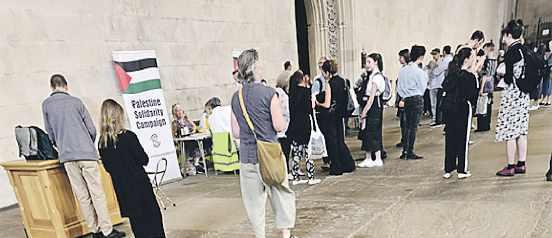
We were told signage was considered on a case-by-case basis and was used by the PSC to direct individuals to a mass anti-Israel lobby event supported by Jeremy Corbyn and several other MPs.
Lord Pickles, the government’s special envoy on post-Holocaust issues, told Times Radio the decision on the Shoah exhibit should be reversed.
“Considering the timing of it, that we have just commemorated the 80th anniversary of

the liberation of the concentration camps, I was frankly astounded,” he said. “If you are going to ensure the Palestinian Solidarity Campaign has something there, it’s not unreasonable to have a government-funded exhibition there.
“Dealing with the questions of antisemitism, Westminster Hall is where Churchill laid in state, where he received many honours. There was perhaps no greater fighter against antisemitism than Churchill. He would be appalled by this decision.”
Disturbing ignorance about the basic facts of the Holocaust has been revealed in the first eight-country survey undertaken by the New York-based Claims Conference.
The survey — of America, Britain, France, Austria, Germany, Poland, Hungary and Romania — showed most respondents in each country except Romania believe something like the Holocaust could happen again.
Concern is highest in the United States, where more than three-quarters (76 percent) of adults surveyed believe this, followed by the UK (69 percent), France (63), Austria (62), Germany (61), Poland (54) and Hungary (52). In Romania, the figure is 44 percent.
Shockingly, some adults said they had not heard or weren’t sure if they had heard of the Holocaust before taking the survey. This is amplified among young adults aged 18-29, the most recent reflection of local education.
Additionally, while Auschwitz-Birkenau is the best-known camp, nearly half (48 percent) of Americans surveyed were unable to name a single camp or ghetto established by the Nazis during World War II.
On a more positive note, there is overwhelming support for Holocaust education. Across all counties surveyed, 90 percent or more adults believe it is important to continue teaching about the Holocaust, in part so it does not happen again.














The Times said Cave had secured spots for his exhibition at the European parliament in Brussels and the German parliament in Berlin. He applied to bring it to Westminster Hall, for a week that would have included Holocaust Memorial Day, 27 January.
Cave told Times Radio: “It’s one of the great tragedies, I think, of the social media era, and my fear is that by parliament being perhaps more ready to house one side of the argument but not the other – that’s kind of dangerous.”
Claims Conference president Gideon Taylor said: “The alarming gaps in knowledge, particularly among younger generations, highlight an urgent need for more e ective Holocaust education. The fact that a significant number of adults cannot identify basic facts — such as the six million Jews who perished —is deeply concerning.
TIME: 09:30 TO 12:30 (AGES 6-7)
TIME: 13:00 TO 16:00 (BOYS 8-11)
COST: £30 PER DAY OR





WEEK











A parliamentary spokesman said exhibitions were “completely di erent” from signage, which was for the sole purpose of directing individuals during a mass lobby.
“Equally troubling is the widespread belief that something like the Holocaust could happen again, underscoring the critical importance of educating people about the consequences of unchecked hatred and bigotry ... it is clear there is still much more work to be done.”
London mayor Sadiq Khan stressed the vital need for Holocaust education in all schools as he attended the ceremony marking the 80th anniversary of the liberation of Auschwitz.
Speaking to Jewish News as he also visited the site of the Jewish ghetto in nearby Krakow to honour the memory of those who faced Nazi tyranny, the mayor praised communal organisations working to ensure the lessons of the Shoah were not forgotten.
“It is vital every child learns about the Holocaust in a proper, considered way... so when they see these short clips on TikTok, when they see nonsense on social media, they know it’s nonsense,” Khan said.
The mayor praised the UK government’s pledge to ensure every child at school in this country is taught the history of the period.
“The best antidote to false information on social media is for those of us that have been here, met Holocaust survivors, met those whose parents perished, to tell the story,” he said, adding: “And I tell you this, in London we’ve got the biggest Jewish com-
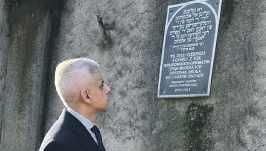
munity in the country, almost 150,000 Londoners who are Jewish, who have a parent, a grandparent, a sibling, an uncle an auntie who perished in the Holocaust or who survived the Holocaust.”
Khan praised Keir Starmer and education secretary Bridget Phillipson’s push to ensure all schools in the UK had the resources to o er education on the Shoah to every pupil.
The mayor has made it his duty to attend Holocaust commemorations in this country and abroad since he was first elected.





























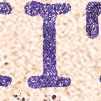





















































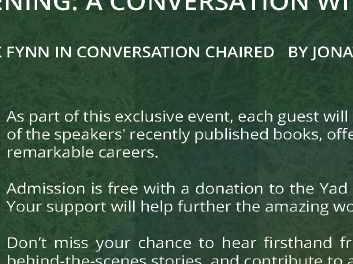

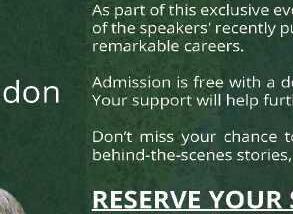





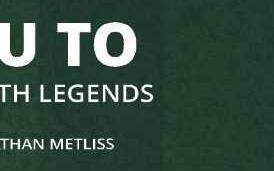
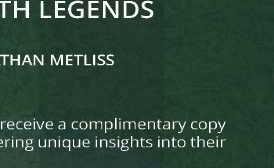

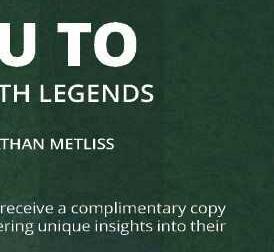


What do Natan Sharansky, the Shark Tank (US equivalent of Dragons’ Den) investor Daniel Lubetzky and Israeli special envoy for combating antisemitism Michal Cotler-Wunsh have in common?, writes Jenni Frazer.
They all interacted with the former Chief Rabbi Rabbi Jonathan Sacks, who died in 2020, leaving behind a remarkable legacy of books, videos and audio material.
Now Dr Tanya White, a lecturer at Bar-Ilan University, has launched a podcast, Books & Beyond, in which she and 16 global Jewish voices discuss Rabbi Sacks’ teachings, and try to answer the question, “What would Rabbi Sacks Say?” in response to the challenging issues facing the Jewish world after 7 October 2023.
“I’d been teaching about Rabbi Sacks’ books over many years to many of my students,” says UK-born White, “and when 7 October happened we had been reading [his book] Future Tense, which is a very positive outlook on the Jewish narrative... And I remember that we came back after 7 October and we were really stalled, asking, what are we going to do with this narrative now –is it still relevant?”
Acknowledging that “no one knows [exactly] what Sacks would say”, she nevertheless believed that there was su cient rich material available to allow for “deep and critical engagement”. Her vision was “to get the ideas in his
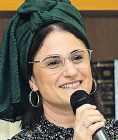
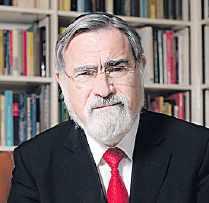
books out to a wider public, not just the few hundred women that I teach every week.”
So she approached 16 people, each of whom had been wrestling with
these questions themselves, and who had interacted with Sacks.
White interviewed each person and drew on the ideas in four of Sacks’ most important books for discussion. She said the majority of interviews had consciously incorporated his thinking in their particular fields.
Sharansky is a classic example, says White. “He and Rabbi Sacks had almost a parallel trajectory in their lives. It sounds ridiculous – one lived in the Soviet Union, one in England. But they both had this epiphany moment in 1967.” The podcast shows that each moved from thinking Judaism was something they had to endure to looking at it as a gift.
A UK launch of the podcast will take place in London on 3 March.
Healy, education secretary Bridget Phillipson and business secretary Jonathan Reynolds, university chiefs are urged to put in place “all necessary precautions” to ensure recruiters are not put o from appearing on campuses.





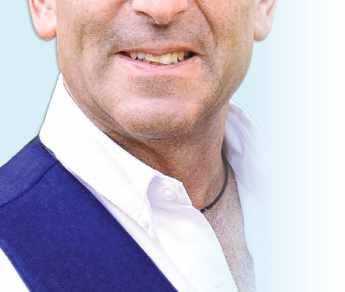

The ministers suggest that a “vocal minority of students” are currently being allowed to deprive the defence sector of the opportunity to engage with potential new recruits at university fairs across the UK.
The community’s leading disability charity has said chronic underfunding is leaving services facing their “hardest” year ever.
The remark was made at Kisharon Langdon’s inaugural fundraising dinner as it revealed a £4.5m funding shortfall in 2025.
Chief executive Richard Franklin told more than 800 guests: “These are deeply, deeply challenging times… the hardest I have known it to be. Despite the chronic underfunding of social care, we must develop and deliver world-class services, respecting the integrity of each person we support.”
Kisharon and Langdon joined forces in 2023 in the largest Jewish charity merger in decades. The organisation supports more than 500 people and their families every day, with a turnover exceeding £24m.
Chief Rabbi Ephraim Mirvis told Jewish News: “The dinner was very inspirational and Kisharon Langdon is a truly wonderful organisation.
“We as a community are blessed to have an organisation which instils such compassion and consideration into the lives of all those who benefit and their families.”
Sandys Row Synagogue in Spitalfields has enlisted the Foundation for Jewish Heritage to explore adding a heritage centre on the Jewish East End, writes Michelle Rosenberg.
The oldest surviving Ashkenazi synagogue in London is a Grade II listed Georgian building, acquired by a group of immigrant Dutch Jews in the 19th century.

While Sandys Row’s membership has inevitably declined, the synagogue benefits from being close to the City and hosts a busy weekday lunchtime minyan for local workers.
The synagogue also receives increasing numbers of visitors including school groups wanting to learn about the East End and its various immigrant communities.
The heritage centre idea arose from this growing interest and a feasibility study will test the idea con-
sulting with local organisations and potential audiences.
Henry Freedman, synagogue board member, said: “My family has been connected with Sandys Row since its very founding. It is a gem of a place in what is now a very busy and attractive part of London.
“The idea of a heritage centre is something we have been considering for some time and we are delighted to now be working with the Foundation for Jewish Heritage
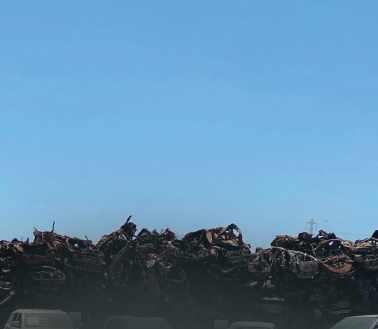


to take forward the concept.”
Michael Mail, chief executive of the Foundation for Jewish Heritage, said the synagogue was an important testament to the once great East End Jewish community. “The Jewish presence in, and contribution to, the area was enormous, and Sandys Row is the perfect place to tell that story,” he added.
The foundation’s flagship project is the Welsh Jewish Cultural Centre being developed at the grade II-listed former Merthyr Tydfil synagogue with National Lottery Heritage Fund and Welsh government support.
The East End was at one time the centre of the largest Jewish community in the UK, with more than 50 synagogues. Today Sandys Row is one of only two functioning shuls that remain, a legacy of a once vibrant Jewish life that has become largely forgotten in the area.

For the seventh year running the Festival of Spoken Ivrit gave more than 5,000 nursery, primary and secondary pupils across London, Cambridge and Richmond the experience of Ivrit as an interactive language.
With 82 performances over two weeks, the Festival was launched by Israeli House at JW3, with a showcase of four productions themed around heroes and heroines.
The Israel Hour Theatre (Teatron Hashaa HaIsraeli) presented a range of plays, including an adult production for Holocaust Memorial Day.
The moving story of Avraham Oerbach, a child survivor, titled Sentenced for Life, coincided with the 80th anniversary of the liberation of Auschwitz.
Community advice charity Paperweight has raised more than £500,000 in its latest matched fundraising campaign, ensuring the expansion of its free, practical support services.
The funds, from more than 2,500 donors, will sustain and grow the charity’s work across legal, financial, welfare, post-bereavement and administrative matters. This includes money advice, family law, civil law and immigration clinics, elder care, housing, and ‘Paperlite’ monthly check-ins.

The schools festival opened at Hasmonean Boys’ Middle School in Belsize Park, with special guest Lord Polak, followed by a performance of Champion of Israel, detailing Oren Smadja’s journey to winning an Olympic gold medal.
Younger audiences enjoyed The Lion and The Mouse and Peter PanTom’s Superhero, a twist on Peter Pan’s tale.
An Ivrit teacher at the school said: “Peter Pan was a tremendous success. Both children and teachers enjoyed every moment. I am proud to be Israeli and to be part of this beautiful cultural endeavour.”
A Sinai pupil added: “I loved the show. I understood the Hebrew and it felt magical. I enjoyed it all.”
Chief executive Bayla Perrin said: “This campaign has reinforced the importance of our work, ensuring we can continue to provide free and expert assistance to those who need it most. Right now, we’re taking on 50 to 60 clients each week.”
Paperweight’s expansion continues, with a new Leeds o ce opening in November, joining its existing locations in Gateshead, Manchester, Bournemouth, Brighton and Birmingham.








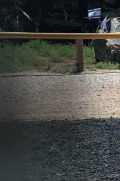




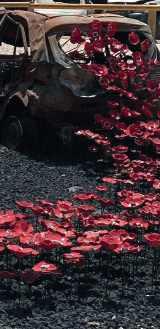
WIZO’s ANNUAL YOUNG WRITERS’
Write a tribute, a poem, a story, a comic strip – fact or fiction about someone with strength.
• Physical strength
• Inner strength
• Emotional strength
• Communal strength

in conjunction with the Jewish News and PJ Library
Win an iPad for you and your school! One for the winner in each age group and one for each of their schools. The runner-up in the primary category will receive a PJ Library goody pack and the runner-up in the secondary category will receive book tokens.
Information can be found in the Jewish News online, as well as on the WIZO & PJ Library websites.
emma@wizouk.org 020 7319 9703 wizouk.org


Jewish News meets... Dr Peter Prinsley MP
When he rises to speak in the House of Commons, it is hard not to assume that Peter Prinsley MP has been doing the political beat for years.
Without being cruel, it’s fair to say the active Norwich Synagogue member and Board of Deputies representative has mastered the art of delivering his message in Parliament’s pressurised environment far quicker than some of his younger colleagues also elected at last July’s general election.
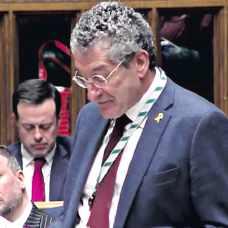
Take the 66-year-old’s recent Prime Minister’s Question time intervention on regime change in Syria, for instance.
While debate on the Middle East has provoked some of the most foul and partisan language from MPs, Prinsley rose from his seat on the Labour benches to ask gently: “What practical measures can the UK take to help ensure that Syria now has the best chance of becoming an open society and the second functional democracy in the region?”
Drawing on his near-three decades of experience as an otorhinolaryngologist – a physician specialising in diseases of the ear, nose, and throat – he added: “We have in our NHS many brilliant émigré and refugee surgeons from the greatly troubled Middle East.
“I have been privileged to work alongside some of them from Iran, Iraq and from Syria.”
Then again in a Commons debate leading up to Holocaust Memorial Day, Prinsley said: “On Monday, I will stand in Abbey Gardens in Bury St Edmunds, at a steel teardrop erected as a memorial not only to the six million Jews murdered in the Holocaust but to the 57 Jews slaughtered by their neighbours in Bury St Edmunds in March 1190.”
Meeting Prinsley at his Westminster o ce, it becomes clear he is relishing the opportunity which has been given to him fairly late in his career to become an MP.
And he seems clear also of a responsibility

to be a voice for those in the UK Jewish community who have not lived in the main communal hubs such as London and Manchester.
At the last general election, Prinsley caused one of the surprises of the campaign by defeating the Tory candidate, the former Downing Street special adviser Will Tanner, in the constituency of Bury St Edmunds and Stowmarket, previously considered to be one of the Tories’ safest seats in the country.
The Conservatives mounted a lacklustre campaign, while Prinsley’s medical credentials impressed voters on the doorstep, as did the old post o ce van his campaign team used to secure backing for the Labour representative.
“A common thing people would say on the doorstep was that I was the first political person they had ever met,” Prinsley recalls. “People started saying something should change and maybe we should vote Labour. That’s exactly what happened.”
Having gained vital experience in local politics in Norwich, Prinsley secured more than 16,000 votes and a 1,452 majority at the general election against his Tory opponent to become the first Labour MP to represent the seat.
“I’m still the most astonished person here,” he laughs, reliving his unexpected journey into Westminster. “I have a continuous sense of being astonished, but I’m enjoying it.”
Prinsley’s victory has also helped to boost the number of Jewish MPs whose backgrounds stem from the lesser publicised regions of the country.
“I suppose what I am is a small communities British Jewish person,” he says, recalling his upbringing growing up in the now-defunct Middlesbrough Hebrew Congregation from a family of immigrants who settled in northeast England and in north Yorkshire.
Prinsley’s mother’s family were originally from London but had been evacuated during the war, while his grandfather had a peanut business in Yorkshire.
“We were the only Jewish boys in school, me and my brother,” he recalls, of the small community in which he grew up. “You know, people think that Anglo-Jewry is really London, Manchester, Leeds and Glasgow. But something like a quarter of all the Jewish people who identify live in small communities. ”
A Labour Party member for as long as he can remember, as well as a Jewish Labour Movement one, he says: “Labour in a way had been the natural home of the Jewish population. You didn’t have to think who you were going to vote for. If you were Jewish you voted Labour.”
Prinsley accepts that for a fair part of the community up until the last election, such con-
tinued loyalty to Labour would have seemed “astonishing”. He adds of Keir Starmer’s election victory: “But more must have voted Labour again this time.”
The Prinsley family is linked closely to the Norwich Hebrew Congregation at the Norwich Synagogue, close to where they now live.
His wife, Dr Marian Prinsley, who served as sheri of Norwich between 2019-2021, is a former president of the shul. They have three children and are now grandparents.
Asked what advice he would give those younger than him in the community, possibly considering a political career ahead of university, he says: “Join a political party, work out what it is that you actually believe, and try to get active in your community.”
“There are various organisations that you can join that are quite inspiring,” adds Prinsley, who points to the Fabians on the Labour side.
“I don’t know what the equivalent is on the

Conservative Party, but I imagine there is something, I’m sure,” he adds.
Then he’s o to finish work on a speech that will almost certainly impress those who hear it in that afternoon’s debate.


Beloved Holocaust survivor Ann Kirk has died at the age of 96, writes Michelle Rosenberg.
The Shoah educator died shortly before Holocaust Memorial Day, just weeks after her husband, a fellow Kindertransport refugee.
Born in Berlin in 1928, Ann travelled to the UK alone on the Kindertransport after the Kristallnacht pogrom of 1938. Her parents were murdered at Auschwitz in 1942.
In testimony for the Holocaust Memorial Day Trust, Ann recalled her journey via Hamburg and Southampton to London where, “wearing
labels round our necks and carrying only a small suitcase, we waited for our names to be called out”.
Taken in by two “aunties”, Ann went to boarding school, which she hated, and then to South Hampstead High School, which she enjoyed.
She met her future husband, Bob, at a club for young Jewish refugees run by Woburn House. They married in May 1950, had two sons, and devoted their lives to Holocaust education and Liberal Judaism.
In 2023, the couple were awarded the Citron, Sivan and Sefton Outstanding Lifetime Achievement
Award by the Jewish Volunteering Network for their volunteering work at the Liberal Jewish Synagogue.
Association of Jewish Refugees chief executive Michael Newman said: “The AJR is honoured to have captured Ann’s testimony as part of the AJR Refugee Voices archive.”
Holocaust Educational Trust chief executive Karen Pollock, added: “Ann dedicated her later life to Holocaust education.
“We will particularly remember her and are profoundly grateful for all she did to ensure the lessons of the Holocaust are never forgotten.”
Barnet Football Club cancelled a planned matchday funding appeal for Amnesty International after a backlash from fans over the charity’s hostile stance towards Israel.
The National League club, which has a sizable Jewish fanbase, announced Amnesty representatives would be in and around The Hive stadium for a recent home game against Maidenhead with buckets to collect donations.
But after publicising the move on its website, the club was inundated with complaints from angry fans who accused it of scoring an “own goal” with the initiative.
The club confirmed it shelved the project due to the “large number of comments made towards the collection” and fears it would create an “unsafe environment”.
One angry fan, Jim Kavanagh, wrote on X: “While I have sympathy
with what’s going on in Palestine, Amnesty’s view is so enormously one-sided that this will be a huge insult to Jewish Barnet fans (of which there are many).”
The initiative is believed to have been approved by o cials at the club who were not aware of Amnesty’s track record of publishing scathing reports on Israel.
These include a recent allegation accusing Israel of committing “gen-


ocide” against Palestinians in the Gaza war, a claim denied by Israel, which in turn accused Amnesty International of inventing its own definition of genocide.
Amnesty’s Israel branch has also clashed with its London o ce, saying although death and destruction in Gaza had reached “catastrophic proportions”, its own analysis did not find that Israel’s actions met the definition of genocide.
Guildford has marked the 750th anniversary of the expulsion of its Jewish community, writes Michelle Rosenberg.
The event, billed as a ‘Day of Reconciliation and Understanding’, was a collaboration between the diocese of Guildford, the borough council, the mayor and the rabbi of Guildford, Alexander Goldberg to honour the town’s diverse history, acknowledge historical injustices and aim to promote unity, tolerance and mutual respect.
Queen Eleanor of Provence ordered the expulsion of the Jewish community from Guildford on 16 January 1275, despite its contributions to the town’s economy and society. The move was part of a broader pattern of anti-Jewish policies that culminated in the 1290 Edict of Expulsion by King Edward I.
Rabbi Goldberg said: “This history reminds us of the dangers of intolerance and prejudice. Today, we commit ourselves to justice and compassion, ensuring such marginalisation is never repeated.”
Guildford mayor Sallie Barker referenced the 13th-century Jews mentioned by national records in the mass arrests of the 1270s, saying: “We honour the memory of Josce, Floria, Formosa, Abraham, and others by ensuring their legacy inspires a brighter, more inclusive future.”





























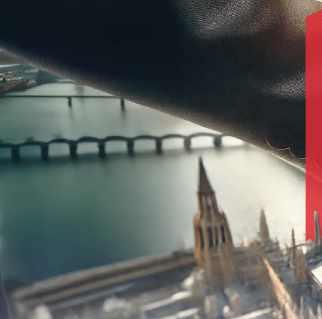
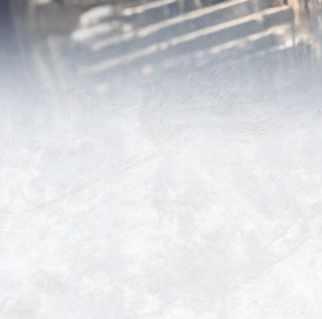









‘I
Emily Cohen has never met Emily Damari, but with her mum Mandy she led the fight to bring her home, writes Michelle Rosenberg
Emily Cohen had her first glimpse of the hostage she fought to bring home through an ambulance window outside Tel Aviv’s Tel Hashomer hospital.
It was part of the globally anticipated convoy delivering Emily Damari, 28, Doron Steinbrecher, 31, and Romi Gonen, 24, to freedom after 15 months in captivity, three of 33 anticipated to be released during the first stage of the hostageceasefire deal between Israel and Hamas.
Londoner Cohen, 54, put her life on hold for 471 days to “dedicate every ounce of my being to do media relations for Israel” and to secure the release from Gaza of a Spursobsessed British-Israeli she’s never met.
An experienced media relations expert, she has been supporting Kibbutz Kfar Aza, from where Emily Damari was kidnapped, since the war following 7 October 2023 started.
On 29 October that year, she was put in contact with Emily’s mother, Mandy. And they’ve worked together ever since, campaigning to bring the hostage home.
Cohen says Mandy Damari is “the strongest person I have met. At face value she is quiet and unassuming. But she is so together, so bright and so stoically strong.”
She adds: “Emily has a tattoo on her left arm which says ‘My mum is always right’ and she
really is. She is a total inspiration for me and I have learnt so much about strength and courage from her. She has made jokes to me over the past 15 months; her humour is part of her defiance and clearly where Emily gets it from.”


Initially reticent to put her self in the forefront of the campaign to bring her daughter home, Mandy was eventually persuaded by Cohen to fly to London for the 7 October anniversary event at Hyde Park last year where she spoke in public for the first time.
“That,” says Cohen, “was her debut to the world and that was how we introduced Emily.”
With Cohen’s support, she met UK prime minister Keir Starmer and foreign secretary David Lammy, with whom she expressed disappointment in December after he failed to call publicly for aid to the Israeli captives hours after she appealed directly to him.
Before the ceasefire had been agreed, she recalls walking her dog in Regent’s Park, speaking to Mandy on the phone in Israel and saying to her: “Look, Donald Trump is get-

ting in in a week. The inauguration is a week today. We need to give it one final push, whatever we can do.”
And then Cohen says she “just had this feeling”. She dropped her dog at home and drove to the airport, securing the last seat on the plane. Everything after that is a blur.
Cohen arranged for Mandy to film a direct appeal sitting on the steps outside Emily Damari’s home on Kibbutz Kfar Aza. She describes Mandy as being “incredible. She talked a lot about Emily. It’s the first time I’d actually been inside Emily’s house. Being there with her and seeing the gun shots in the house was very, very profound.”
The ceasefire was signed the next day, but Mandy “just never, not at one point during this whole process, got remotely sort of excited, because she has had her excitement completely smashed to pieces on too many occasions. So even with this ceasefire, no one really knew. We didn’t know who was coming out, and we didn’t know if they were alive or dead. All we could do was pray and try and keep our spirits up.”

The countdown for the names to be released was “utterly depressing,” recalls Cohen. “On the Saturday, we were all told that at 4pm Israel time, a list would be released.
“The whole of Israel was glued to the TV. I was with Mandy, and 4pm came and went. Then 5pm, 6pm and 7pm. The deal literally was disintegrating before all of our faces.”
She adds: “In hindsight, we’re all morons; idiots to think that we actually would have got that list when they (Hamas) said we were going to get it, because this is all part of the psychological trauma. So after all of that, Mandy and I went to the hostage rally in the Negev. I don’t know how she did that. It must have been absolute torture. I think at that point in time, she just thought, ‘That’s it. Game over’.”
Sunday, the planned release day, started with Mandy “just not believing very much at all. And then at 0945 in the morning Israel time, Hamas put out on its telegram channels the names of Emily, Doron and Romi.”
Cohen’s phone was immediately bombarded by members of the British press, saying “Is it true? Is it true? Oh, my God! Congratulations! “Wow, wow, wow!”
It took an agonising hour before verification came through. But still, Israel didn’t know whether the hostages were alive or dead.
Cohen pauses, remembering. “You can’t imagine the stress, the adrenaline and the hopeful excitement. But not being able to get excited because you don’t actually know what you’re going to be picking up, and if they are alive, what condition are they in?”
In a daze, Cohen wandered down to Tel Aviv’s Hostage Square, which rapidly started to fill with the international press.
“Everyone’s hugging strangers; everyone’s talking to everyone, and they’ve got this massive screen up in the square. And everyone’s watching the screen, and then you see the Red Cross vans bombing it into Gaza, and everyone’s just like, Oh my God!”
Then Cohen saw a freeze-frame picture of all three girls together.
“And there Emily is in the middle. There she is. I’m looking at this girl who I have been campaigning for, on behalf of Mandy, morning, noon
and night, seven days a week since the seventh of October. There she is alive. Then they got into the Israeli vehicles and the square erupted.”
Dazed, Emily Cohen travelled to the hospital. She found herself “standing with all Emily Damari’s best friends, and they’re chanting, ‘Emily! Emily!’
“The helicopters are coming down from the sky right in front of us, the wind is blowing your hair from the rotors and these kids are all surrounding the door of one of the ambulances. Then a window slides open from the one behind, and Emily sticks her head out and gives an enormous wolf whistle.
“It was as if to say, ‘Hey you idiots! I’m in this one, not in that one!’ And then they all went nuts. I could not breathe at that point. I was just beside myself.”
Cohen pauses, reliving the extraordinary experience of that day.
Eventually, around midnight, she arrived back home. “I don’t even remember what time I spoke to Mandy later that evening,” she says.
“It was so overwhelming. I’m not even family,” she says, “but it was amazing to hear her happy. She got her girl back.”
She describes Emily Damari as a “defiant lioness”, adding that “every single thing Mandy has told me about her is true.
“There were 45 people in the hospital all saying of Emily ‘She’s my best friend’. She is totally there for everyone. She is very funny. All the Damaris are. Emily is feisty, powerful and fun. She’s iconic.”

paigning for the release of her US citizen husband Keith [who was finally freed on 1 February] and supporting Liran Berman to bring back his twin brothers Gali and Ziv, who were kidnapped with Emily Damari. She has also been working with lawyers Adam Rose and Adam Wagner, who represent other hostages with close UK connections: Eli Sharabi [also now freed], whose British wife and daughters were murdered on 7 October, and his brother Yossi, killed in January 2024 and whose body remains in Gaza; Oded Lifshitz, whose daughter is British, and Avinatan Or, whose mother is British and whose girlfriend is Noa Argamani.
While she took a few days off to “re-charge and process”, Cohen says she has already booked her next flight to Israel.
While Emily Cohen made sure the public, media and government couldn’t forget the name ‘Emily Damari’, she insists activist group Stop the Hate should get a “huge, huge shout out”, describing them as “the guerilla army of amazing volunteers who have done all the yellow ribbons, poster drops of Emily, all the balloons at the Tottenham Hotspur stadium”.
She adds: “They’ve done all the work. They’re the ones who have gone on to the streets, who did a poster drop of 10,000 posters that went viral across Leeds, Brighton and London.’”
While she’s never met Emily Damari, Cohen says the 28-year-old left her “the most incredible message on my phone. And she sent me a text and a photo of her and her mum, which I will treasure.”

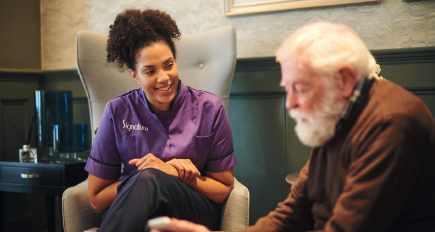

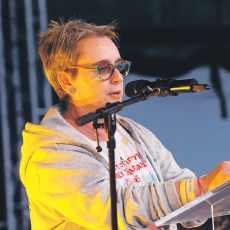
Cohen goes on to praise Gail Davidson as “the PR guru who also needs to be given enor mous recognition for her tireless efforts. She has generously given me hours of her time to help campaign and push Emily’s name to the British media. Without her help I would not have been able to reach the audiences that we have. She really is the publicist extraordinaire.”
Cohen adds: “Now I will be heavily campaigning again for the other hostage families I’m connected to to help them continue the fight.”
These included supporting Aviva Siegel [kidnapped and released after 52 days], cam-
Reflecting on the past 15 months, she says: “To say that I feel so unbelievably grateful isn’t even a strong enough word. The fact that I have been part of this journey that has had this unbelievable happy ending is something I will treasure for the rest of my life. That I was able to be part of it in some way is amazing. I love the Damari family.” And, she says, it was “joyous” to be able finally to take 55 of her Emily Damari posters and throw them in the bin.
Ending the conversation to make a coffee, Cohen says she’s now switching her phone off for two or three dawys. “But,” she adds: “Then I’ll be full throttle again.”
Person-centred care is at the heart of Signature. Our compassionate teams deliver tailored support and companionship, adapting to changing needs while promoting independent living.
With a holistic approach to wellbeing, we bring together expert teams to offer a range of personalised services, ensuring every resident feels supported, valued and empowered to live life to the fullest.

Israel has reached an agreement with the US space agency NASA to include the first Israeli female astronaut on a future space mission, writes Michelle Rosenberg.
Minister of innovation, science and technology, Gila Gamliel, made the announcement at the annual Ramon Conference in Tel Aviv, saying: “We received approval from NASA to send the first Israeli female astronaut into space.”
She also announced the Israeli Space Agency ISA has begun screening candidates.
The minister did not say when the Israeli astronaut is scheduled
to join NASA activities and in what framework she will fly into space but added her ministry is promoting the development of the space sector, and the Israeli space market had the potential to reach an annual turnover of 15 million shekels (£3.4 million) by mid-century.
President Isaac Herzog sent a recorded greeting in which he said: “We are currently living in an exciting period in space exploration, in which humanity is discovering new ways to utilise space technologies, not only to explore the stars, but also to promote global health, stability and prosperity on Earth.”
Police in Australia have seized explosives they believe were intended for a plot to target Jews, along with material containing details of Jewish institutions.

A typed two-page letter signed by Golda Meir dated 16 May 1928, written shortly after her move to then-Palestine as a young Zionist leader, has sold at auction in Los Angeles for an undisclosed sum.
The correspondence, addressed to the “Hachlutz” Histadrut, a Jewish labour movement, o ers a glimpse into the early Zionist endeavours and the struggles of the Jewish workers’ organisations.
In the letter, Meir discusses the halt in immigration and its impact on the agricultural settlements, the e orts of the Female Workers Council and the need for continued immigration and establishment of new settlements.
The haul was found earlier this month in a camper van in a suburb of Sydney. Police disclosed the find some days later amid rumours of arrests and a steady background of disquieting antisemitic incidents in the country.
Chris Minns, the premier of New South Wales, the state that includes Sydney, said the discovery was “alarming” and would strike terror into the community, particularly the Jewish community”.
From individuals items and specialist collections to complete house clearances, removals, and probate valuations. We do as much as you need - just ask !!!
• As an independent broker acting on your behalf, I aim to get the highest prices for your pieces
• No need to worry about posting your valuables
• I sell through many different auction houses, high-end dealers, collectors and private clients
• With over 18 years in business you will always receive my personal discreet one-to-one service
• Free consultations at your convenience
He added the situation had to be met with “the full resources of the government and I want to assure the people of NSW that’s exactly what’s happening”.
The arrests were made by members of Strike Force Pearl, a police unit launched to combat antisemitic violence in Sydney.
It is signed by Meir “Golda Myerson”, the name she used in her youth, and countersigned by her colleague Elisheva Kaplan, wife of future prime minister Levi Eshkol.
Also under the hammer was a National Medal of Science awarded to Kindertransport survivor Walter Kohn in 1988 by President Ronald Reagan. Kohn died in 2016.




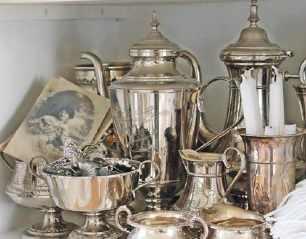








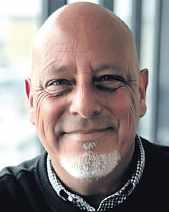
Ian Epstein
One of the flight attendants killed in last week’s plane crash in Washington DC was a former member of a Jewish youth group with a passion for travel and a talent for comedy.
Ian Epstein, one of the four attendants on American Eagle Flight 5342, was an alumnus of BBYO and one of 67 victims of the crash on Wednesday night over the Potomac River, in which an army helicopter collided with a passenger aircraft.
BBYO, a pluralist youth group, posted: “Our hearts are heavy as we mourn the loss of Ian Epstein, an AZA [Aleph Zadik Aleph] alum, who tragically lost his life in the plane crash at Reagan National Airport yesterday. Ian was a proud member of our movement
and attended our summer leadership camps at Perlman [in Pennsylvania] in 1987.”
Commentators shared recollections of him, including one who called him “always a lively, highspirited person”. Several said they had known him and his sister from their time with the youth group.
Epstein’s love for seeing new places was clear from his online posts. According to his LinkedIn profile, before becoming a flight attendant in 2020 he founded a travel agency and worked as a motor home salesman.
According to an Instagram account he kept active about a decade ago, Epstein lived in an motor home at one point and posted photos from his destinations,
A leaked memo from the Pentagon responding to President Donald Trump’s controversial executive order banning diversity and inclusion initiatives listed annual Holocaust Day (HMD) events among those being paused.
The memo, circulated by the Defence Intelligence Agency (DIA) – the Pentagon’s intelligence arm – listed 11 different events observed in the United States that employees there are no longer allowed to plan for with office activities.
Featured on the memo, which has been leaked on X, are this year’s Holocaust Day/Days of Remembrance events scheduled to take place in May.
In the United States, Holocaust Day/ Days of Remembrance runs from the Sunday before Yom Hashoah to the following Sunday.
The US Congress established Days of Remembrance as the nation’s annual commemoration of the Holocaust.
This year’s events were scheduled to start on 24 April.
Last year’s national ceremony featured a keynote address by President Joe Biden.
Every president since the US Holocaust Memorial Museum opened in 1993 has delivered the keynote address at a Days of Remembrance ceremony.
Meanwhile, Jewish News has also been sent a separate memo raising fears Trump’s overhaul of the distribution of foreign aid will also see the end of funding to a major Holocaust education programme conducted by UNESCO.
writing in one post: “Travel as much as you can as far as you can as long as you can, life is not meant to be spent in one place.”
His ex-wife Debi told local media Epstein, who had two childen, with a daughter getting married in eigfht weeks, “died doing what he loved”.
Epstein was known for his sense of humour, and since publication of his name a video of him delivering jokes and one-liners during in-flight announcements on a regional flight to Charlotte has been viewed more than a million times on TikTok.
“There is absolutely positively not to be one ounce of mopeyness or groaning on this plane,” he says at one point. “Welcome aboard, everybody.”
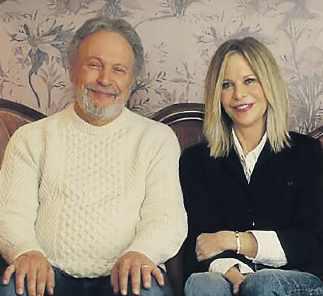
Harry meets Sally again
Billy Crystal and Meg Ryan – stars of When Harry Met Sally – have reunited at New York’s Katz’s Deli. This time, however, the duo were there to create a series of TV adverts for Hellman’s mayonnaise. The campaign will air during the Super Bowl championship game of the US National Football League (NFL) in New Orleans on “Super Sunday”, 9 February.

Editorial comment and letters to the editor
As Yoni Jesner’s mother, Marsha Gladstone, makes painfully clear in our front page story this week, Israel is trapped in an appalling dilemma. The urgent imperative to free its hostages from Hamas comes at a high cost: the release of convicted murderers, the legitimisation of false moral equivalencies and the looming threat of future attacks.
The release of Yoni’s killer, Ashraf Zughayer, after serving 22 years of a six-life-sentence term, is a gut-wrenching injustice for Marsha and her family. Rabbi Gideon Black, Yoni’s cousin, who survived the 2002 attack that killed Yoni, calls it a “deal with the devil”. There is no question that freeing criminals today will endanger Israelis tomorrow. The precedent is there for all to see: Yahya Sinwar, freed in exchanage for the IDF soldier Gilad Shalit in 2011, returned to lead Hamas and orchestrate mass murder on 7 October. Many more have walked free in previous swaps only to resume their psychotic obsession. There is every reason to fear history will repeat itself.
Meanwhile, parts of the media disgracefully suggest a moral parity between Israeli hostages – innocent civilians, including children – and Palestinian prisoners, many convicted of unspeakable crimes. This grotesque equivalence is not just an insult to justice but a cruelty inflicted upon grieving families. And yet, there is only one choice to be made. The hostages must come home.
Everything else – what happens next, who walks free, the future dangers – comes second. In this moment, the first and only priority is the safe return of those taken. The rest will be dealt with later, as it must be.
This is Israel’s grim reality: forced into a cycle of moral agony, where no option is good and every path leads to pain. But a nation that values life above all else cannot abandon its own.
The catch-22 is appalling, the consequences unbearable. But there is no greater duty than bringing the hostages back.
Marianne Evelyn Gabriel Faithfull was known as the muse of the Rolling Stones after a relationship with Mick Jagger, their lead singer.
Her maternal grandmother, Rosa, was born into the wealthy Jewish Ziprisz family of Transylvania.
Rosa married into the aristocratic Austro-Hungarian von SatcherMasoch family.
Secretly opposed to the Nazi regime in Vienna, their daughter, Eva, was considered a mischling (the pejorative term for mixed ‘Aryan’ and ‘non-Aryan’) by the regime, because of her half-Jewish birth. She became a dancer
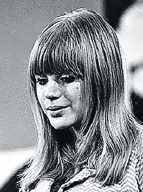
in the Berlin of the 1920s and married Robert Glynn Faithfull, a British Intelligence officer, and later professor of Italian history.
Marianne, whose haunting voice led to stardom, was born in Hampstead.
After a meteoric career, she descended into anorexia, becoming addicted to heroin and at one time becoming homeless.
She died on 30 January, aged 78. Although brought up in the Catholic religion, she was halachically Jewish.
Doreen Berger
Jewish Genealogical Society of Great Britain
Last week, on the day the 80th anniversary of the liberation of Auschwitz was marked by coverage on morning news, when the BBC devoted a whole afternoon to the ceremony at the former camp, what did Channel 4’s 7pm news lead with? Film of destruction in Gaza, and it did not even start with
the confirmation of the deaths of several hostages. Channel 4 is consistently anti-Israel in its reporting and is no longer the reliable and impartial news bulletin it once was. On such a moving day of commemoration this was a deep disgrace.
Barry Hyman, Bushey Heath
Apologies for writing a third time on these pages about the issue of suspending arms licences, but if Lord Hermer (16 January) is still insisting that his government made “purely a legal decision”, he might have to come back here and offer up a better explanation.
Yes, the decision was based in a legal framework, but it was taken pursuant to policy criteria put in place by the (previous) government. The law merely allows the government to create those criteria, apply them and reach a decision, rather than make its decision for it. This is, therefore, a political decision backed by law, rather than a legal decision. This is equally true for a decision not to suspend arms sales.

necessary. Another reason was, as former Foreign Officer minister Andrew Mitchell observed, that it would involve misapplying the policy test.
Any Israeli breaches of humanitarian law in prospect at the time were not in areas which (as the test explicitly requires) involve use of UK-exported arms. The Labour government’s official policy paper not only didn’t explain this, it virtually admitted as much – and yet it still went ahead with the suspensions.

That is one of the reasons why Hermer’s Tory predecessors concluded that no suspensions were
Thank you for helping to make Jewish News the leading source of news and opinion for the UK Jewish community. Unlike other Jewish media, we do not charge for content. That won’t change. Because we are charity-owned and free, we rely on advertising to cover our costs. This vital lifeline, which has dropped in recent years, has fallen further due to coronavirus.
Today we’re asking for your invaluable help to continue putting our community first in everything we do. For as little as £5 a month you can help sustain the vital work we do in celebrating and standing up for Jewish life in Britain.
Jewish News holds our community together and keeps us connected. Like a synagogue, it’s where people turn to feel part of something bigger. It also proudly shows the rest of Britain the vibrancy and rich culture of modern Jewish life.
You can make a quick and easy one-off or monthly contribution of £5, £10, £20 or any other sum you’re comfortable with. 100% of your donation will help us continue celebrating our community, in all its dynamic diversity. Support Jewish News by visiting our donor page at jewishnews.co.uk
Hermer was therefore wrong to dismiss the suggestion by an audience member at the recent Jewish Labour Movement conference that this was a matter of interpretation. It is part of his government’s attempts to hide behind the law when making inherently political choices on Israel.
Naji Tilley, By email






























CLAUDIA MENDOZA CHIEF EXECUTIVE, JEWISH LEADERSHIP COUNCIL
Last week we marked 80 years since the liberation of Auschwitz-Birkenau. We remembered the six million innocent Jewish men, women and children who were murdered by the Nazis.
We also honoured the strength of the survivors who have courageously shared their testimonies to ensure new generations understand the dangers of extremism and hate. In a world marked by increased antisemitism, remembering the Holocaust remains more important than ever.
THERE IS A TREND OF ERASING JEWS FROM THE NAZI GENOCIDE
However, in the last week or so, I have seen the concerning rise of both Holocaust universalisation and inversion, thereby erasing the unique experience of Jews. So let me be clear: the genocide of European Jews by the Nazi regime was unique both in its systematic nature and industrial scale.
In January 1942, Nazi o cials met at Berlin-Wannsee to plan the “Final Solution to the Jewish Question”. This followed years of dehumanisation and ghettoisation of Jews across Nazi-occupied Europe. Under Himmler’s decree, Auschwitz was to play a key role in these extermination plans, and the mass transportation of Jews to Auschwitz began that year. In all, 1.1 million people were murdered there. The vast majority, approximately one million, were Jews.
Of course, it is important to remember the other victims of the Nazis, including Poles, disabled people, gay people, Roma and Sinti. It is also right to commemorate more recent genocides in Cambodia, Rwanda, Bosnia and Darfur. However, the genocide against Europe’s Jews remains a unique atrocity that demands distinct recognition, remembrance and education.
It is for this reason that I was so disappointed to hear a Good Morning Britain news reporter refer to the six million Jewish victims of the Holocaust simply as “six million people”. Additionally, there was no mention of antisemitism throughout the entire report. I have also seen several statements from Members of Parliament commemorating Holocaust Memorial Day omitting any mention of Jews.
It is welcome that GMB apologised for its error. However, there appears to be a worrying trend of erasing Jews from a genocide in which six million Jewish men, women
and children were slaughtered specifically because they were Jews.
More worrying, however, is the ongoing attempt to draw comparisons between the Holocaust and the current conflict between Israel and Hamas.
To compare the systematic murder of six million Jews to Israel’s war on Hamas is not only absurd but deeply o ensive to survivors and the wider Jewish community.
Many in the community will have seen the Irish president Michael Higgins address a Holocaust Memorial Day event which he was asked not to attend by members of Ireland’s Jewish community. While it was not a surprise that he used his speech to reference the conflict in Gaza, it was shocking to see Jewish members of the audience thrown out of the room for objecting.
Only recently, Ireland adopted the IHRA Working Definition of Antisemitism, which states that equating the State of Israel to Nazi Germany is antisemitic. Higgins’ hijacking of Holocaust Memorial Day makes one wonder why they did.
Even more disgracefully, the Islamic Human Rights Commission called for boycotts of Holocaust Memorial Day events this year unless they included a reference to Gaza. Those who call to boycott Holocaust Memorial Day events unless they are inverted to associate modern-day Jews with their persecutors are the clearest example of why we must keep the memory of the Holocaust alive.
On Holocaust Memorial Day, I had the privilege of hearing Janine Webber’s testimony at the Foreign, Commonwealth and

PDevelopment O ce’s Holocaust Memorial Day commemoration event.
Unfortunately, as Holocaust survivors grow older, first-hand survivor accounts are becoming less easily available. Initiatives like the Holocaust Educational Trust’s Ambassador Programme and Testimony 360 do vital work to advance Holocaust education.
I also support the construction of a new Holocaust Memorial and Learning Centre in Westminster, which will enshrine Holocaust remembrance at the heart of our democracy. In a world of rising antisemitism, where people seek to abuse the memory of the Holocaust, this is more important than ever.
NICOLE LAMPERT JOURNALIST & CAMPAIGNER
erhaps it was almost inevitable. The Holocaust, once universalised to make an uncaring world give a damn about what the Nazis did to the Jews, is now being used against us to the point where we have seen Jews dragged out of a Holocaust Memorial Event which attacked Israel.
How many times have we seen the libel that the Jews are doing what the Nazis once did? That Jews are the new Nazis? For some, at least, this leads to the sick conclusion that Hitler was correct in his desire to wipe out Jews – yes there is a social media hashtag trend which proclaims #HitlerWasRight. And it is always worse after Holocaust Memorial Day (HMD), not better.
Howard Jacobson famously asked more than a decade ago "When will Jews be forgiven the Holocaust?". He noticed how people were rejecting "the burden of guilt by turning the tables on those we have wronged
IRELAND IS NOW ONE OF THE MOST ANTISEMITIC PLACES ON EARTH
and portraying ourselves as the victims of their su ering". I don’t know if this is inevitable, but I do think we need to fight harder against it.
There isn’t a better illustration of how the Holocaust has been perverted than to see what recently happened in Ireland. A president accused of antisemitism gave a speech at a Holocaust event leading to Jewish people being violently dragged out of the room.
If the organisation which calls itself Holocaust Education Ireland actually cared about Holocaust education, it would not have invited Irish president Michael D Higgins to give the keynote speech at its HMD commemoration. This is a man who has long had an obsession with the Israel-Palestine conflict, who presided over conspiracy theories that the Israeli embassy had leaked his correspondence with Iran (when Iran had itself published the material on social media) and whose country has become one of the most antisemitic places in Europe.
This is why the small embattled Jewish community in Ireland asked that his invitation to speak at the event be rescinded.
When they were rebu ed, well-known Irish Holocaust survivor Tomi Reichental made a personal plea to Higgins not to mention ‘international politics’ saying: "It should be strictly about the Holocaust and the small minority of Jewish people who are
living here, that they should be protected’. What arrogance – what a betrayal of those who were murdered in the Holocaust – that Higgins should deliberately ignore these wishes. And how telling it is that no one from Israel was allowed to speak at the event.
It is no wonder that by the time the phlegmy president had spat out his thoughts about Gaza and asked "How can the world continue to look at the empty bowls of the starving?" at least four Jewish people stood up and turned their backs to him. This is their right, and as quiet and as stoic as any act of defiance can be. They didn’t shout and scream, they simply turned their backs.
But that was too much for some. First one visibly pregnant Jewish woman was dragged away and behind her came an Israeli lecturer called Lior Tibet who was pushed to the ground and then pulled out of the room.
"It is our event to commemorate," Tibet said after. "How am I, as a Jew, being kicked out of my own event?"
Does the Holocaust still belong to the Jews? I’ve lost count of the times I’ve been told Jews need to stop selfishly hogging the Holocaust. Keir Starmer may have pledged that every child will learn about the Holocaust but our Holocaust education is a failure when I find a note in my son’s schoolbook saying "The Holocaust didn’t just happen to the Jews – gay people, the Roma and black people were also victims".
Holocaust education has miscarried when I have to explain to my son’s history teacher the Holocaust is the word only for the genocide of the Jews which was a specific plank of policies she was meant to be teaching and there are other words to use about the Nazi crimes against other minorities.
How can our children possibly learn the lessons of the Holocaust when it becomes so universalised that it is about all minorities, all genocides, to the point that sometimes the Jews are even left o the lists of Holocaust victims?
I look outwards to the wider uncaring world; one in which even as our children learn more about the Holocaust that we ever did, we see antisemitism is rising.
But I look inwards to our community too and say we need to demand that the Holocaust should be taught properly.
We need to explain the specificity of the industrialised murder of Jews which makes it di erent from any other genocide. And we need to be teaching about antisemitism on Holocaust Memorial Day because no one else appears to be willing to do it.
The Holocaust message of ‘Never Again’ has never felt more pertinent when we see synagogues being firebombed, Jewish people being physically attacked and we all feel the drumbeat of rising hatred. It appears no one but us is listening to that lesson.


ALEX HEARN DIRECTOR, LABOUR AGAINST ANTISEMITISM
Almost 80 years after the Holocaust, on 21 July 2024 at about 11.30am, there was an explosion at the old IG Farben chemical plant in Auschwitz. One person was taken to hospital and sta were evacuated from the resulting fire, which penetrated the roof. I stumbled across this news a few months after it happened, tucked away in the website of the huge international chemical company operating from Auschwitz. It’s hard to believe but there are still hundreds of chemical engineers working in Auschwitz. In 2015 the Auschwitz branch of the Association of Chemical Industry Engineers and Technicians, which has existed since 1947, held a conference celebrating ‘70 years of Polish chemistry in Auschwitz’. Count back 70 years from 2015 and you arrive in 1945.
The opening speech at the conference, made by a university professor, was about

“the beautiful traditions of the Auschwitz chemical industry’’. This was followed by a lecture from the association’s president entitled Chemistry in Auschwitz 1945–2015, which mentioned the legacy of IG Farben. The exhibition that accompanied the lecture featured ‘Hitler’s IG Farben plans’.
IG Farben may no longer be a household name, but in the 1930s and 1940s it was the largest chemical company in the world. It created a vast synthetic chemical factory called Monowitz, or Auschwitz III, built to produce synthetic chemicals for the war e ort, such as rubber, explosives and fuel. Slave labour from Auschwitz concentration camp was used to build it, killing 30,000 mainly Jewish inmates in the process. IG Farben director Otto Ambros wrote about the slave workforce, saying “our new friendship with the SS is very fruitful”.
IG Farben also produced Zyklon B, the cyanide-based chemical poison used to kill at least 1.1 million people in the gas chambers, almost one million of whom were Jews. IG Farben’s contribution to the Nazi war machine resulted in members from both sides of my family being turned to ashes in Auschwitz.
IG Farben had a unique collaboration with the Nazis from the start, financially boosting the party in 1933 and helping it to gain power. Its synthetic technology specialists, advisers and production were crucial tools for Hitler’s war, and the the Nazis guaranteed their profits. The Poles inherited IG Farben’s infrastructure in 1945 after Germany was defeated, utilising what remained of a readymade industry built on billions of Nazi Reichsmarks and murdered Jews.
The rebranded, sanitised version of the IG Farben factory is still a global leader in producing synthetic materials, supplying leading tyre manufacturers with rubber, and it is the largest producer of polystyrene in Europe. It is possible that the tyres on your car or the polystyrene in your packaging were made in Auschwitz.
Calling for the chemical plant to be closed or even moved seems unnecessary, but there is a lack of acknowledgment and accountability that has never been properly confronted. The chimney of the Auschwitz plant has been used to broadcast Christian music on commercial radio across the region since 1999.
In 1947 the Nuremberg trial known as the ‘IG Farben trial’ led to only 13 of 24 board members being found guilty. They served short prison sentences and then resumed director-level positions in large-scale industries, especially within legacy companies from the now broken-up IG Farben, such as Bayer and BASF. They were allowed to carry on with their lives, and their role in the Holocaust was quickly forgotten.
The recent explosion in Auschwitz was attended to by the local fire brigade. How will the explosion in antisemitism be put out?
The discourse around Jews feels more polluted than it has in the 80 years since Auschwitz was liberated. There is an obligation to properly confront the past and speak out against this normalisation.
The acclaimed author Primo Levi was a slave labourer producing synthetic rubber at the IG Farben chemical plant.
He wrote in The Black Hole of Auschwitz: “Auschwitz is outside of us, but it is all around us, in the air. The plague has died away, but the infection still lingers and it would be foolish to deny it.”
MANDIE WINSTON CHIEF EXECUTIVE, UJIA
Immediately upon landing in Israel this week everyone on my flight frantically turned on their phones to view the return of our hostages. As I approached passport control I wept, watching Mandy and Emily Damari share what was surely the best hug ever.
For the past 15 months, our hearts have been turned towards the communities of the Gaza corridor who have experienced unimaginable su ering. Thanks to their resilience and access to support, including that of the British Jewish community through UJIA, green shoots of recovery are already visible through the cloud of grief and trauma that will never completely disappear.
But in Israel there is another deeply troubling and worrying consequence of this war: the ramifications for those living in and from the north. During October 2023 more than 80,000 people were evacuated from the north, leaving some communities with only a skeleton civilian presence. Precious startups permanently relocated to the centre of the country or closed. Schools and colleges, including those built over the years by UJIA,
were mothballed. Even outside the designated evacuation zone (0 to 5km from the border) relentless rocket fire has left many, especially young people, profoundly traumatised.
There is now great trepidation about how a government-mandated return to the north, expected for 1 March, will work in practice. Even before the war, access to medical facilities, transportation links, quality education and skilled employment were serious challenges in the region. UJIA leadership recently spent two days in the north, assessing and understanding the needs, listening to local people and considering how our limited funds can best make a di erence.
We visited Kibbutz Manara, where you could previously sit on your balcony, drink a beer and wave sardonically at Hezbollah. No more. It is currently empty of civilians, with houses on one entire side of the kibbutz destroyed by Hezbollah rockets.
Manara is so close to the border with Lebanon that there is not even a second of warning before a direct hit (even on the Gaza border one has 15 seconds to get to a shelter).
Manara’s older residents are determined to return as soon as possible but if young families don’t feel they can do so safely then what is the future of the community?
Kiryat Shmona, the largest community in
the region, still feels like a ghost town. Dedicated teachers in the town are preparing to take back their evacuated students, currently scattered over 500 locations, many of whom have fallen through the gaps and avoided school since they were evacuated. Large numbers of homes are uninhabitable in Kiryat Shmona because of extensive damage from rockets and having been forcibly evacuated for months. No one expected to be displaced for this long. In downtown Tiberias we meet in the evening with a group of teenage girls from moshavim on the border. They have been evacuated for 15 months to one room per family in local hotels, including some who rent rooms by the hour. It’s unclear how many of the teenagers have parental supervision and their UJIAsupported madrichim are their daily lifeline. The girls talk in the same breath about their excitement to return to the privacy of their old bedrooms and their terror of more rockets.
We pray that the ceasefire in the north will hold as the six-week mark approaches. If it does, it is still expected that about a third of evacuees will choose not to return to the north, having settled in communities that o er far better educational and employment opportunities. A high percentage of those who will return are likely to be those who rely on state social support and won’t have any other option other
than to return once the monthly government stipends for evacuees end.
Without a strong civilian presence on the northern border with Lebanon, we are left with a profound strategic threat to Israel.
For now, UJIA’s work supporting at-risk young people evacuated from the north must transition to targeted support of those same young people as they return home. Most have huge learning gaps and experience active trauma. This work is urgent and vital.
Despite the daunting challenges and devastation, we left with hope. The dogged determination, passion and goodwill of civil society, political leadership, entrepreneurs, farmers and educators means that the situation can be turned around if resources are available. As they said: “Ein breira; there is no other choice. If we don’t rebuild the north, then it impacts the security of the whole country. This is the true meaning of Zionism in 2025.”
But they do feel forgotten, by the government who can only o er limited support for recovery, and by the world. We, the British Jewish community, need to stand at their side, o ering solidarity and tangible help, as so many of us have done for the communities of the south through fundraising, hostage campaigning and people-to-people connections. Our hearts are big enough for both.







On the 80th anniversary of the liberation of Auschwitz, more than 120 people gathered at Yavneh School, Borehamwood, for a screening of The Commandant’s Shadow, organised by Rebbetzen Joanne Dove of Seed and supported by AJEX. The film tells of the commandant’s father, who murdered more than a million Jews at Auschwitz, and Anita Lasker-Wallfisch, the cellist who survived the camp against all odds. In a recorded message Anita’s daughter Maya spoke of the ongoing relevance of Auschwitz in confronting rising antisemitism and race hatred; a message from the commandant’s grandson Kai was read aloud: “Being part of this film helped my dad come to terms with our family’s horrific legacy, transitioning from shame to acceptance and repentance.”
The Jewish Leadership Council partnered with the employee group Meta Jews@ to bring together 150 Jews working in tech for a networking event. The event was kicked off with a presentation by JLC chief executive Claudia Mendoza, followed by a panel debate with Gabriela Hersham (of the workspace provider Huckletree), Anthony Eskinazi (founder of the parking app JustPark) and Josh Hart (YuLife), hosted by Adam Benjamin, who runs the Jewish employee group for Meta’s Europe and Middle East region.
324 TEAMS DO BATTLE
Twenty-four teams turned out at Allum Hall in Hertfordshire for the annual Norwood Quiz Night. The teams of 10 raised almost £16,000 for the charity that supports children with neurodiversity and their families, and people with neurodevelopmental disabilities. Compered by comedian Philip Simon of Borehamwood Comedy Club, the quick-fire rounds were run by organiser QuizQuizQuiz.
4A WEDDING ANNIVERSARY AND A BIG BIRTHDAY
Mazeltov to Helen and David Tarlow, who recently celebrated 60 years of marriage, with proud family members Michael, Jeremy, Rebecca and Melissa Tarlow delighted to share the news. And a special centenary celebration took place for Alice Engel, first-generation kinder, who celebrated her 100th birthday with family, many travelling from Austria to be there. World Jewish Relief’s chief executive Paul Anticoni also attended.
5SEEDING THE NEW YEAR WITH A SHABBATON
Seed hosted an inspiring Shabbaton at the Brighton & Hove Jewish Community Centre (BNJC), bringing 20 local families to launch a collaborative ‘Link and Learn’ initiative. Highlights of the weekend included a musical Havdalah ceremony, a learning session featuring Seed’s interactive educational resources, and supper for the children.
6 MANCHESTER MESIVTA’S WEEK OF CELEBRATIONS
Manchester Mesivta (formerly Jewish Grammar School) celebrated its 75th anniversary with events including a Melave Malka (post-Shabbat meal) for staff and current parents. The school choir performed, and a fundraising campaign met its £500,000 target, with plans to upgrade school facilities, develop outdoor spaces, expand the sixth-form offering, enhance pastoral care and commit to furthering academic excellence.












For the seventh year running the Festival of Spoken Ivrit gave more than 5,000 nursery, primary and secondary pupils across London, Cambridge and Richmond the experience of Ivrit as an interactive language. With 82 performances over two weeks, the festival, organised by Tzemach Productions, was launched
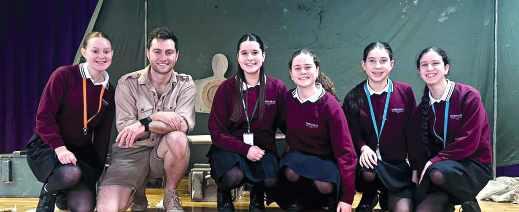
at JW3 with a showcase of four plays themed around heroes and heroines. The Israel Hour Theatre’s productions including an adult drama for Holocaust Memorial Day. The schools’ festival opened at Hasmonean Boys’ with ChampionofIsrael, detailing Oren Smadja’s journey to winning an Olympic gold medal
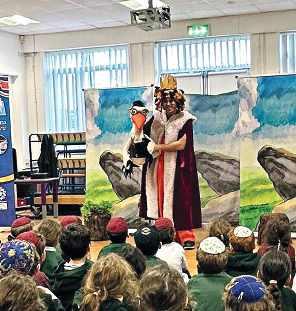


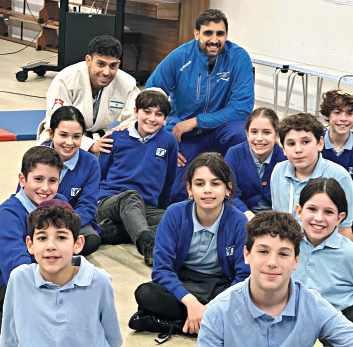



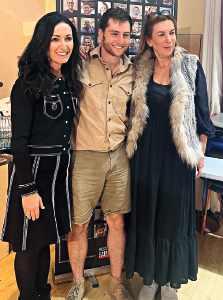
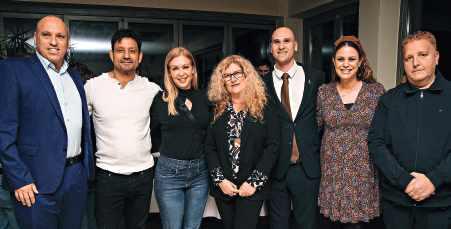





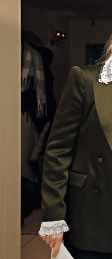




US senator and former college basketball star Ron Wyden o ers 12 rules for navigating life and making a di erence.
By Jenni Frazer
Of all the odd paths to fame, Ron Wyden’s must be among the oddest. He is a onetime college basketball star, topping 6ft 4in, who is now an American senator with a 43-year-long track record in US politics, and the second most senior Democrat in the Senate.
He’s not, of course, the only sports star to have taken up politics. But he is the only one to marshal his four decades in public life into an entertaining memoir called It Takes Chutzpah, complete with Ron’s 12 Rules of Chutzpah, his guide to navigating American — and, by extension, global — society.
We spoke the week before Donald Trump’s second inauguration, and since Senator Wyden’s book opens with sadness and regret about the 2021 Capitol riots — the leaders of which have since been granted a presidential pardon by Trump — I wondered what his feelings were about Trump’s second term in o ce. (In his book he calls Trump a “loudmouth” and says he and his “enablers” have warped the concept of chutzpah, saying Trump has used it for “evil ends”.)
Face to face, Wyden, the consummate politician, falls back on a major theme in his book. “I’ll work with anybody who is going to take steps to improve the lives of the American people,” he says.
“I see my job as opposing bad things and working for good things.” He leaves, delicately floating in the air, the question of which camp Trump falls into.
Wyden has a history of getting things done by co-operating with Republican opposite numbers. Part of this may be a part of a kind of folksy charm which befits his role as senator for Oregon: he talks at length in his book about his atti-
tude to meeting local Oregonians, frequently taking part in community basketball games and holding impromptu “street surgeries”, dealing with citizens’ problems.

one of the last Jews to be gassed at Auschwitz. But out of this great pain came the Jewish American experience, which Wyden believes has many positive lessons to o er.
Wyden’s father, who changed his surname as soon as he started getting bylines, became a globetrotting and award-winning journalist, passing on his innate curiosity to his son.
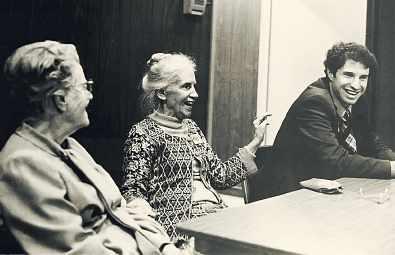
ball scholarship by the University of California in Santa Barbara. But injuries put paid to his dream of turning professional and so he transferred to Stanford, and then to the University of Oregon to read law.

enough to be o ered a full basket- and getting things done. Wyden
By chance Wyden discovered basketball aged 12, and was good enough to be o ered a full basket-


from the o . He writes: “My name



tikkun olam. But you


religion or background, tikkun olam
But back to Wyden and chutzpah. This is an avowedly Jewish book insofar as Wyden lays his credentials on the table right from the o . He writes: “My name is Ron Wyden. Every day I get up and try to fix the world — a vocation we Jews call tikkun olam know what? If you’re reading this book, then regardless of your race, religion or background, is your occupation too”.



world but if they have the
His rules of chutzpah, Wyden says, will enable everyone to fix not only their own, immediate world but if they have the enthusiasm, perhaps to fix the wider world too.
Chutzpah is “mother’s milk for Jews”,

Chutzpah is “mother’s milk for Jews”, says Wyden, though he is careful to quote a rabbi saying that there is indeed such a thing as “bad chutzpah”.
But Wyden’s is a Jewish book for another reason. “I am the grandchild and child of Jewish refugees from Nazi Germany. My parents, born Peter Weidenreich and Edith Rosenow, fled the Nazis with their parents in the 1930s.”
various “rules of chutzpah”, which owe a lot to his one-time ambition to be a professional basketball player. These include Chutzpah Rule 4: “Show up every day prepared to play”; in other words, however much you may be disinclined to become involved, turn up and take what life throws at you. “Everyone takes hits,” he writes. “The test of a true chutzpahdik is to bounce back.”

While still a student, he fell into a part-time job interning for the US politician Senator Wayne Morse, who taught him the basics of both chutzpah and advocacy, and getting things done. Wyden helped Morse on the campaign trail in his Senate race in 1974.


Wyden records that many of his relations did not survive the Holocaust, and that his Great Uncle Max was
Wyden records that that his Great Uncle Max was




Morse won the seat in May, but died of leukaemia in July of that year, leaving Wyden devastated.
Morse won the seat in May, but year, leaving Wyden devastated.








body’s attention during his time 82-year-old woman called Ruth Haefner, a retired social worker, found an Oregon branch of the

It became a force with which be needs of older people a national imperative across
Nevertheless, the tall student (now aged 23) had attracted somebody’s attention during his time working for Wayne Morse — an 82-year-old woman called Ruth Haefner, a retired social worker, who wanted Wyden to help her found an Oregon branch of the Gray Panthers, an advocacy group for the American senior citizens. It became a force with which to be reckoned, making the needs of older people a national imperative across America.
The next step, when

speaking up for older stone of his political life over the next five
Or Rule 3: “Leading is coaching. You’ve got to bring people and ideas together around a shared goal.” Wyden advises that while those around you are thinking in the short-term, the way to succeed is “to play the long game”.
Perhaps my favourite of Ron’s Rules of Chutzpah is the first one: “If you want to make change, you’ve got to make noise.” He later introduces the caveat that it has to be productive noise — for chutzpah to be effective, he says, it must be purposeful.
A UK equivalent of Wyden would be, I think, a backbench MP who doggedly sponsors progressive private members’ bills and places sometimes difficult issues on the national agenda.

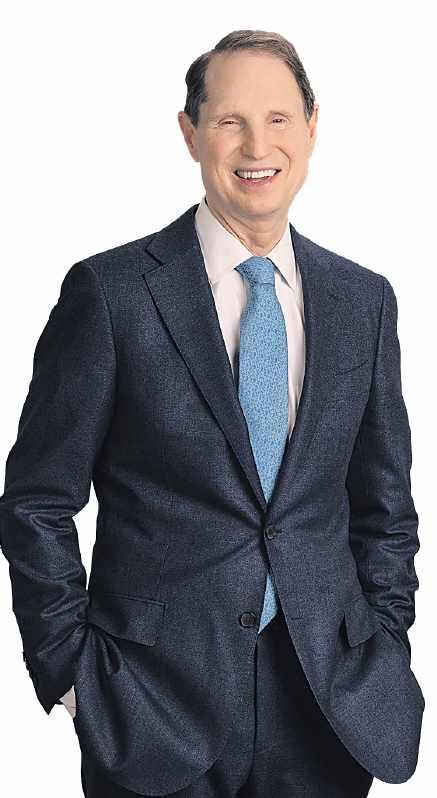
vexed questions on health, women’s issues
The next step, when he was 28, was to run for Congress. He won and speaking up for older people became a cornerstone of his political life over the next five decades, together with vexed questions on health, women’s issues and the environment.
“I’ve tried to use my experience to help other people,” he says. “For me, chutzpah and tikkun olam are two sides of the same coin in that they try to make the world a better place. I think everyone has an inner chutzpah. You can use these rules to polish it, and make a di erence.”
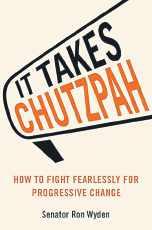


details his triumphs and victories, much American issues. But he pins such triumphs to his
In the book Wyden details his various triumphs and victories, much of which are very specific to domestic American issues. But he pins such triumphs to his
Wyden is today a powerful senator, chair of the Senate finance committee and a keen supporter of Israel. He insists, both in his book (which is his first) and in our conversation, that this is not a sideways bid for him to become president. But I can’t help wishing that back in the summer, when Joe Biden was faltering at the microphone, that instead of Kamala Harris getting the Democratic nomination we had seen Ron Wyden and his chutzpah rules on o er to the US public.
You never know, as he reminds us, where chutzpah can take you.


By Candice Krieger candicekrieger@googlemail.com


Elliot Gold, co-founder of flexible o ice space provider Work.Life, says this rapidly growing sector is particularly popular among smaller businesses
ork to live or live to work?
Elliot Gold would rather you didn’t have to choose.
As founder of the flexible o ce space provider Work. Life, he is on a mission to make a positive change in the world of work.
Work.Life o ers flexible o ce solutions for companies and freelancers designed to foster productivity and community among its 9,000-plus members.
Gold founded Work.Life in 2015 alongside David Kosky, a former associate director of London & Capital. Today, there are 15 Work.Life locations throughout the UK, in London, Manchester and Reading.
Speaking to Jewish News from Work.Life’s Soho site, Gold, a third-time start-up founder, says: “When we founded Work.Life in 2016, we set out to create a better way to work. Like many people, in our previous careers we had experienced some great workspaces but also some terrible ones! We wanted to make a positive change in the world of work.”
While still a relatively young industry, the co-working sector is rapidly gaining traction. This has been driven by the global shift towards more flexible and hybrid work models, fuelled by technological advancements and the growth of the freelance economy. This change, accelerated by the pandemic, has led to a surge in demand for flexible co-working spaces.

According to Grand View Research, the global co-working spaces market was valued at $14.91bn (£11.91bn) in 2023 and is projected to grow at a CAGR of 15.7 percent from 2024 to 2030. That’s over $40bn.
“While the pandemic itself was miserable for us, it led people and companies to rethink their o ce space,” says Gold. “Perhaps they no longer had a primary o ce, and then saw the benefit that flexible work spaces have to o er.”
Co-working flexible o ces have become popular among small and medium-size enterprises (SMEs), which account for about 40-50 percent of global memberships, according to reports, while freelancers are estimated to represent 30-40 percent of co-working users.
Work.Life, unlike many of its competitors, specifically targets smaller SMEs - solutions include hot desks, individual cubicles, private o ces, break-out areas and meeting rooms - providing them with the flexibility they need to scale their operations without the commitment of long-term leases and reducing overhead costs.
Members come from a range of sectors, including tech startups, creative agencies, professional services, e-commerce, health and wellness, charities and education and training. They include Seatfrog, Global Fund for Children, Gymkhana, Unmind, Danish Crown, Ninth Seat and Listen.
ible workspaces – has thrust the co-working industry into the global spotlight.
Founded in 2010, WeWork expanded rapidly but ended up filing for bankruptcy in November 2023. Its ambitions led to excessive valuations ($47bn at one point) and overspending, resulting in a failed IPO in 2019 that exposed its massive losses and unsustainable practices. This shook investor confidence and damaged the reputation of the co-working sector but also sparked renewed interest in co-working spaces, highlighting the importance of sustainability, community focus and operational e ciency in this evolving market.
Gold says: “I do think the industry was tainted as a result of what happened with WeWork. There were opportunities for us to take on some of its premises but we made a decision not to as we wanted our buildings to be designed in a particular way and in line with our brand.”

Work.Life has seen a significant increase in demand for temporary o ce space, notably day bookings and part-time leasing options.

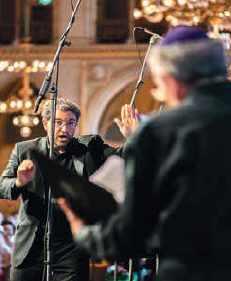


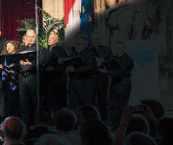
“This demand allows organisations to accommodate a fluctuating workforce without the burden of long-term commitments,” notes Gold, adding that the need for collaborative spaces is also on the rise, with more businesses wanting regular access to meeting rooms and breakout areas.
“Creating spaces where people can come together, collaborate and innovate is essential for the growth of any business, especially SMEs.
“The allure of flexibility is becoming a critical factor for businesses in today’s job market. Companies are now embracing models where teams can secure flexible memberships that allow employees to work from any location that suits their schedules.”
The rise and fall of WeWork – a major player in the co-working industry and the one known for revolutionising the concept of flex-
Work.Life has a business strategy that prioritises growth with minimal capital outlays. By collaborating with landlords for fit-out funding, co-working spaces can expand without the constant need for capital infusion. “Where this model goes wrong is when operators continually need to raise more money for new locations without becoming profitable. Going forward, the winners in this space are going to be those who can run really tight business models like we do.”
Technology will play a big part in this. While the industry has been somewhat unsophisticated in its approach to technological integration, it is essential for businesses to leverage technology to streamline their processes and allow employees to focus on high-value client-facing activities. “There’s a big role for technology to play in this sector now going forward. Technology will not replace human roles but will instead enhance them. As automation takes over routine tasks, sta can redirect their e orts toward creating strong connections with clients, bringing people back to the centre of real estate, and it’s the people that will set you apart from competitors. It’s exciting.”
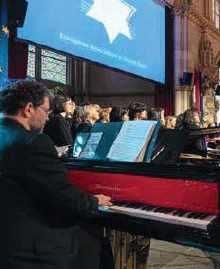


In our thought-provoking series, rabbis, rebbetzins and educators relate the week’s parsha to the way we live today
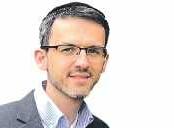
A song for our time

BY RABBI ZVI PORTNOY HENDON UNITED SYNAGOGUE
As I drove my eldest to school last Sunday, I enjoyed the stunning piece of music playing on Tim Lihoreau’s Classic FM weekend breakfast show, prompting me to quip: “There’s nothing like a bit of Sunday morning church music.”
This week’s parsha, Beshalach, is also known as Shabbat Shira to denote the song the Jewish people sang with Moses after crossing the Red Sea. Rashi, the classical commentator on the Chumash, explains the view of Rabbi Nechemiah in the Talmud, that the Jewish people spontaneously sang the song together. He comments that
the Holy Spirit rested on them and miraculously the same words came into their minds at the same time. In recollection of that moment, tradition has named this week Shabbat Shira, the Sabbath of Song.
Song has a central role towards the end of Moses’ life. The final mitzvah of the Torah in parashat Vayeilech is for each Jew to write a scroll. The commentaries on the parasha note the poignant description of the Torah as a shira, a song.
The Netziv (Rabbi Naftali Zvi Yehuda Berlin, 1816–93, one of the great yeshiva heads of the 19th century) interprets it to mean that the whole Torah should be read as poetry, not prose; shira in Hebrew means both a song and a poem.
Most of the Torah is written in prose, but the Netziv argued that it
has two characteristics of poetry. First, it is allusive rather than explicit. It leaves unsaid more than is said. Second, like poetry, it hints at deeper reservoirs of meaning, sometimes by the use of an unusual word or sentence construction.
Prose carries its meaning on the surface. The Torah, like poetry, often does not. The decisive points of the narrative alone are emphasised, what lies between is non-existent; time and place are undefined and call for interpretation; thoughts and feelings remain unexpressed, only suggested by the silence and the fragmentary speeches.
Dr Naomi Cohn Zentner is an assistant professor at Bar Ilan University’s music department. Her research interests lie in Historical Ethnomusicology, sacred songs of
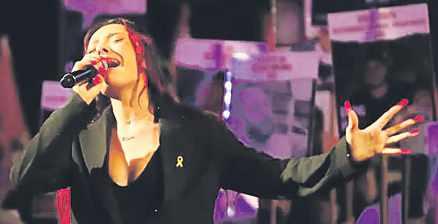
the Ashkenazi domestic sphere, and the cross-fertilisation of Ashkenazi and Sephardi liturgical traditions in Israel. She recently gave a lecture on the deep impact of the 7 October attacks, and the choice of music that has been used, especially in Israel, to help people cope with this incredibly challenging time in Jewish history.
In this context, music in Israel has taken on a dual role: it functions as a sensitive seismograph, capturing and reflecting the national mood and emotions in the aftermath of the tragedy and processing grief, and
it acts as a compass, framing interpretations of the traumatic events and o ering possible pathways for comfort, resilience, and hope. Across all its genres, Israeli music addresses critical issues of belief, unity and the collective identity of Israeli society in a moment of unprecedented crisis. May this Shabbat Shira be one that inspires us with hope and faith and joy. May we find many opportunities in our lives to sing our own unique song to God, including the rich reservoir of emotions yet always grateful for the gift of shira




























Jewish News is delighted to be entering a digital-first era with the launch of a new website and new regular glossy magazine. We are therefore seeking an enthusiastic, emerging sales force to help navigate this new era and to sell these exciting new products alongside opportunities with our portfolio of events and community-leading social media presence.
• Achieving personal and team sales targets. Working to the teams agreed yield and series framework.
• Championing digital first solutions with a particular focus on substantially growing New Business.
• Building and developing strong client relationships and attending meetings and events.
• Identifying revenue opportunities from new and existing accounts and selling solution based integrated campaigns.
• Successfully communicating and introducing digital campaigns to existing print clients.
• Effectively selling across the website, digital publications, social, newsletters, magazines and more.
• Working closely with the Jewish News Publishing and Editorial team to ensure a smooth and commercially successful relationship.
• Working with the Social Team to sell and implement new parthership content.
• Liaise with the Head of Finance to ensure all revenue is accurately reported and invoiced.
• SALARY: Approx 36k plus generous commission package but flexible depending on experience

BY RABBI NAOMI GOLDMAN KOL CHAI HATCH END REFORM JEWISH COMMUNITY
German media spoke of a ‘handshake scandal’ after Syrian’s new leader refused to shake hands with the female German foreign minister last month. Annalena Baebock dismissed criticism, saying she did not expect an ordinary handshake.
Strict Muslims are of course not the only people who avoid shaking hands with the opposite sex – plenty of Orthodox Jews prefer not to do so either. It seems to me that this is a matter of personal choice and religious freedom. The politicians involved were probably briefed about Abu Mohammed al-Jolani’s interpretation of Muslim law; maybe the press should have been too.
We may have anxieties about the direction in which the Islamist leader will take Syria but his religious customs about who he shakes hands with should not be one of them.
When Theresa May, then prime minister, visited President Donald Trump in 2017 he took her hand and led her through the White House – something she did not look at all comfortable with. Sometimes too much contact can be as embarrassing as too little.
As a Progressive Rabbi I shake lots of people’s hands, but I am fully in favour of someone exercising their personal choice not to do it if they do not want to. There’s a Jewish principle of kavod, honouring the dignity of another person. If they don’t want to make physical contact with you, that’s their choice.
The other relevant Jewish principle here is the injunction against
shaming or causing public humiliation to another person. It is an important consideration to anyone who doesn’t want to shake hands in an environment when someone is expected to do that.
During the Covid pandemic some people wore badges saying something along the lines of “please don’t try and hug or kiss me”, so that nobody would be o ended if they ducked. It might be worth considering, if you don’t want to shake hands in an environment where it would otherwise be expected. However, in this case they were in Damascus, so perhaps it’s the western ministers who should have asked the right questions.
Men not shaking women’s hands can feel like an issue when all the people in power are men. The real question is whether Abu Mohammed al-Jolani will enshrine


A stimulating series where our progressive rabbis consider the impact of 21st century issues on our Judaism

women’s rights in the new Syria. If he does, there may soon be Syrian women ministers refusing to shake the hands of male colleagues and it’s hard to imagine that being such a scandal. If you are a man attending
my synagogue and don’t want to shake my hand for religious reasons, you are still very welcome and we’ll find plenty of non-contact ways to establish a friendly relationship. A little mutual respect goes a long way.
Wanted all Antiques & furniture including Lounge Dining and Bedroom Suites. Chests of drawers. Display and Cocktail Cabinets. Furniture by Hille. Epstein. Archie shine. G plan etc in Walnut. Mahogany. Teak and Rosewood.
We also buy Diamonds & Jewellery. Gold. Silverware. Paintings. Glass. Porcelain. Bronzes etc.
All Antiques considered. Full house clearances organised. Very high prices paid, free home visits.
Check our website for more details www.antiquesbuyers.co.uk
Email: info@antiquesbuyers.co.uk
Please call Sue Davis on Freephone: 08008402035 WhatsApp Mobile: 07956268290
Portobello Rd London. By appointments only.
Please note rather than acting as agents for other organisations and charging you commission. Please be assured that in dealing with Antiques Buyers we deal directly with our clients and pay in full at the time of the transaction. Too much contact can be uncomfortable, as Theresa May knows
ARTICLES WANTED
Top prices paid
Antique – Reproduction – Retro Furniture (any condition)
Epstein, Archie Shine, Hille, G Plan, etc.
Dining Suites, Lounges Suites, Bookcases, Desks, Cabinets, Mirrors, Lights, etc.
House clearances
Single items to complete homes
MARYLEBONE ANTIQUES - 8 CHURCH STREET NW8 8ED 07866 614 744 (ANYTIME) 0207 723 7415 (SHOP)
closed Sunday & Monday
STUART SHUSTER - e-mail - info@maryleboneantiques.co.uk MAKE SURE YOU CONTACT US BEFORE SELLING


Furs, Jewellery, Old Costume Jewellery, Watches, Silver, Designer Bags, anything vintage. 01277 352560

Friendly Family Company established for 30 years
We clear houses, flats, sheds, garages etc. No job too big or too small! Rubbish cleared as part of a full clearance. We have a waste licence. We buy items including furniture bric a brac.
For a free quote please phone Dave on 07913405315 any time.

BRIDGE FREE TASTER Tuesday 21st January
Beginners Course Tuesday 28th January
Intermediates Course Monday 20th January Online Beginners Course Monday 20th January
For more details: 0208 905 3877 or schogger@haroldschogger.com www.haroldschogger.com


Confidential Bereavement Counselling for adults and children individually. Support Groups available. We offer in person, online and telephone counselling. Contact Jewish Bereavement Counselling Service in confidence. 0208 951 3881 enquiries@jbcs.org.uk | www.jbcs.org.uk















